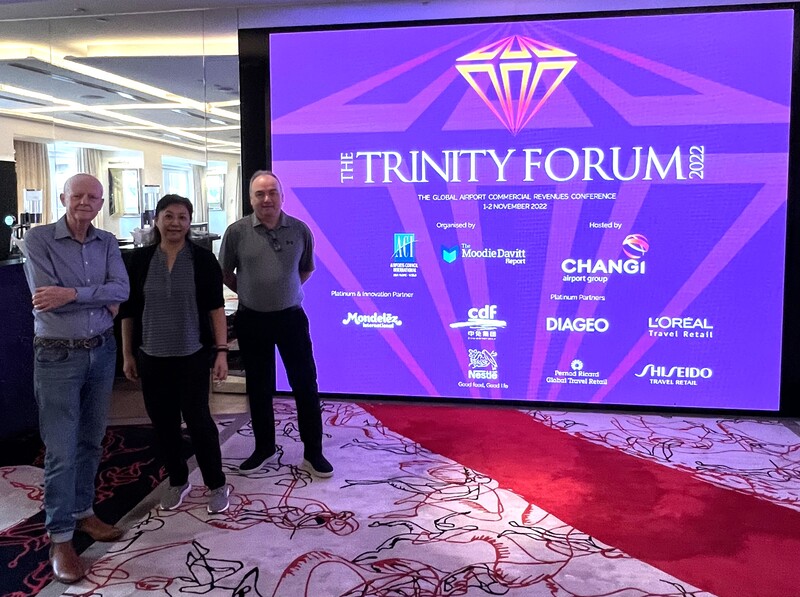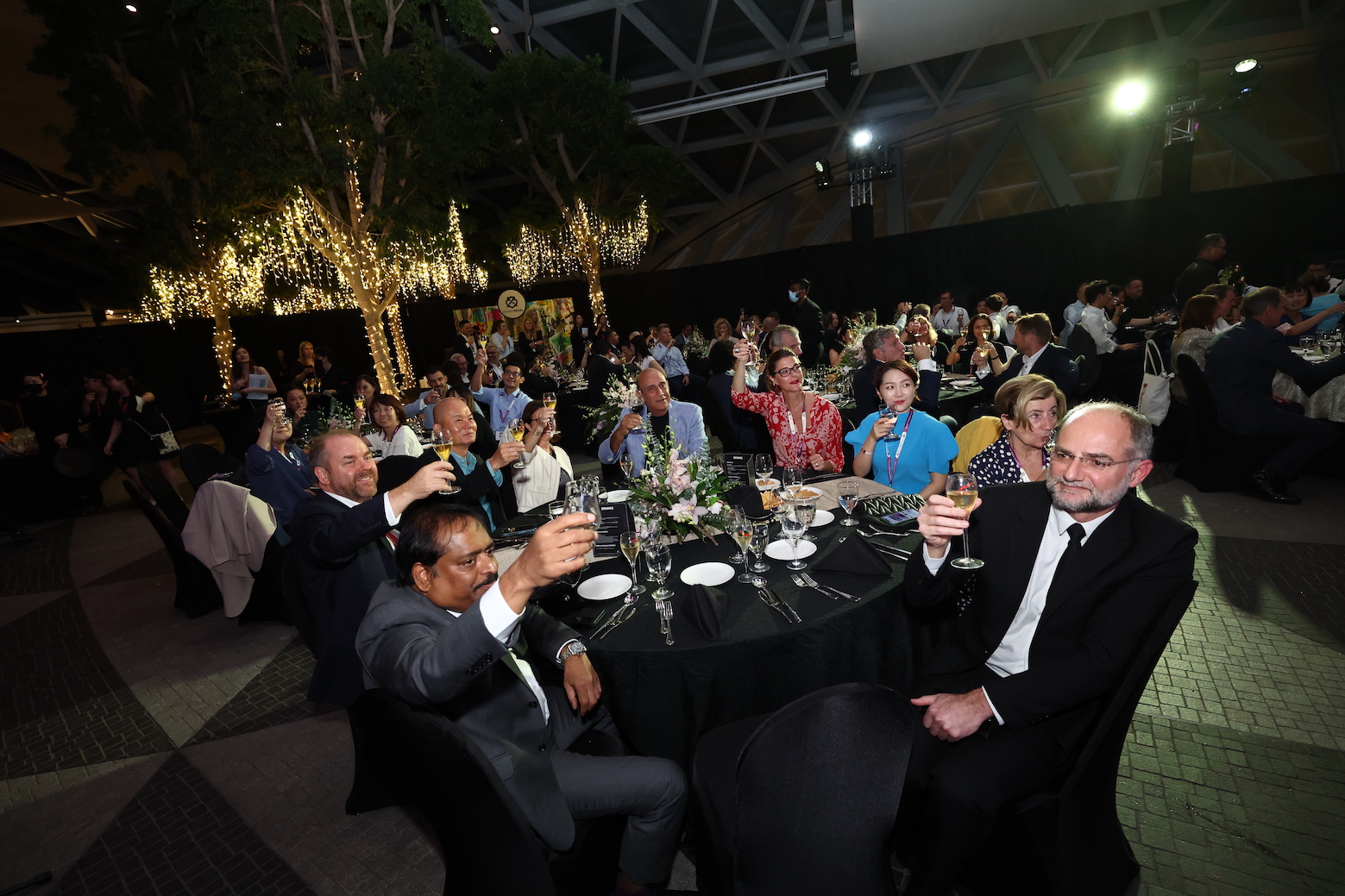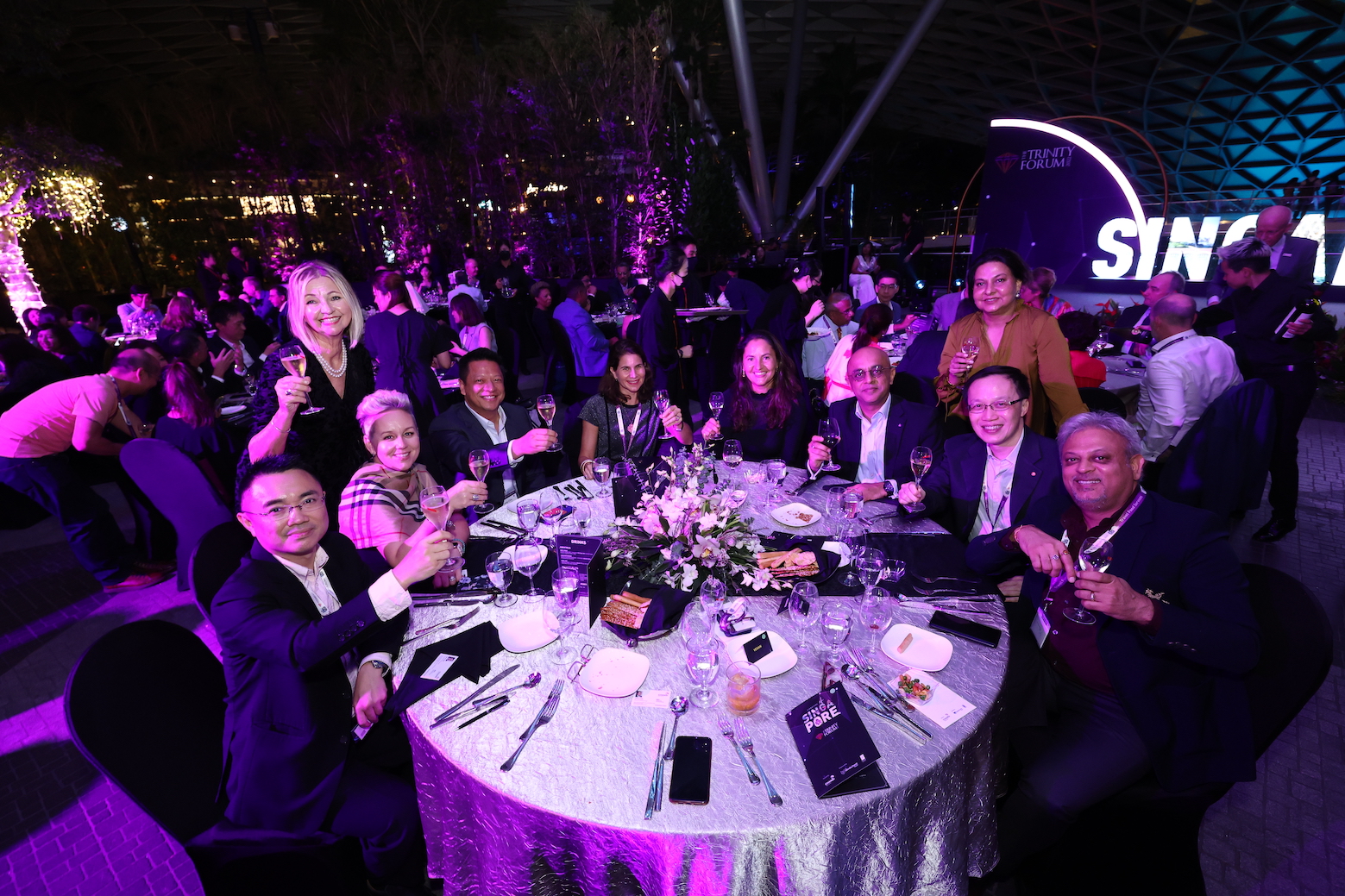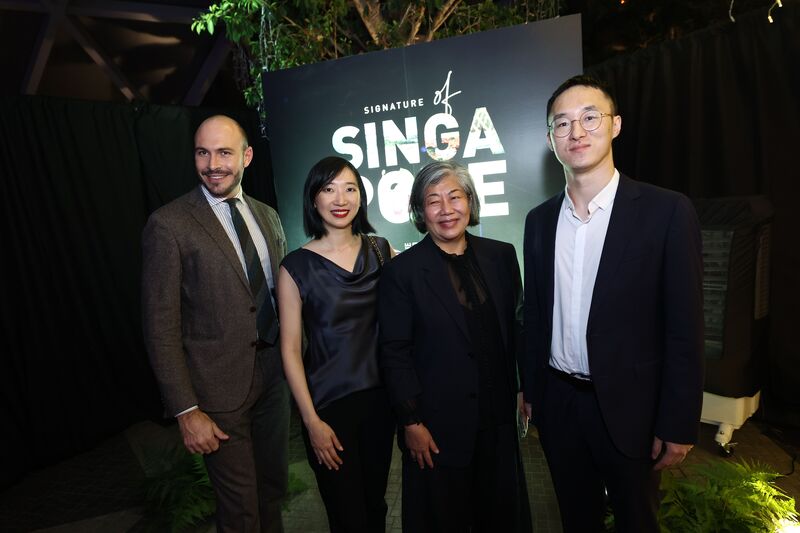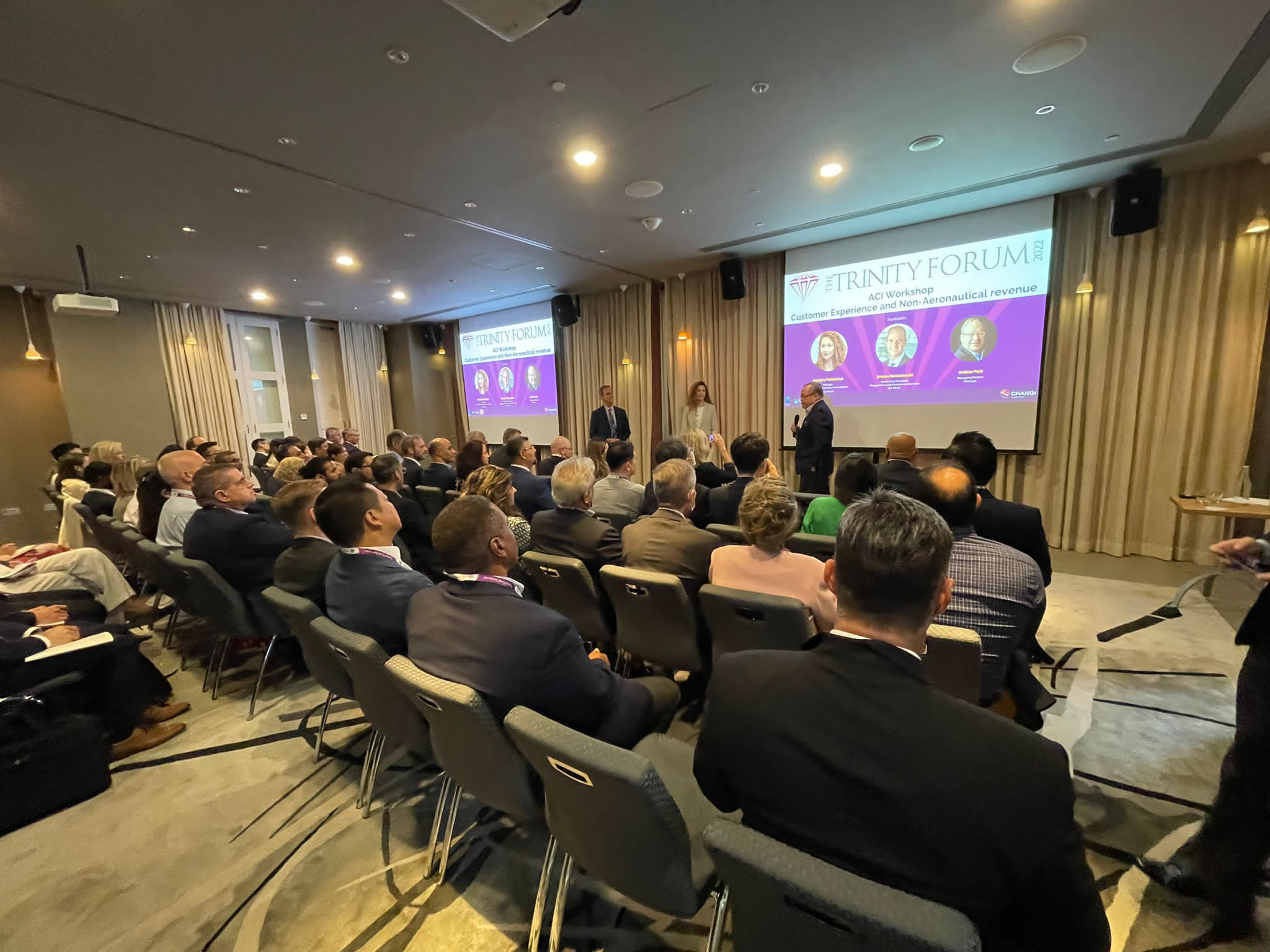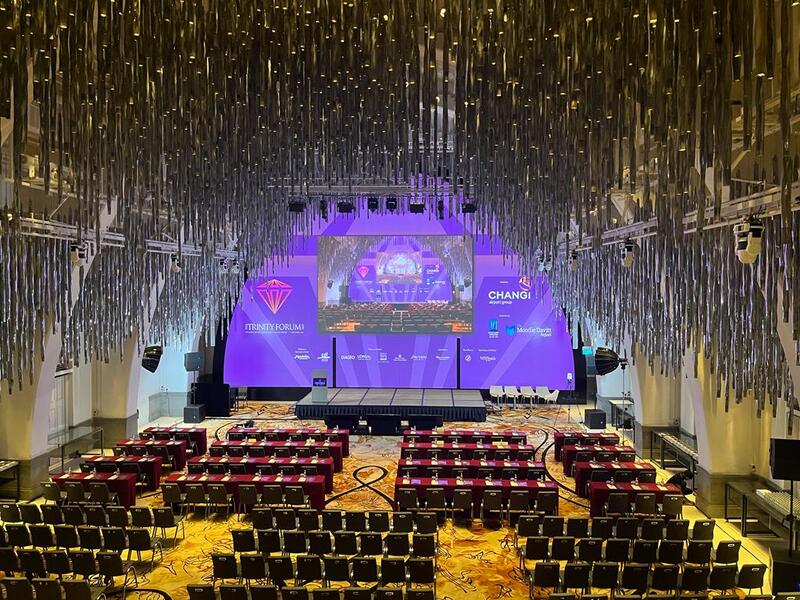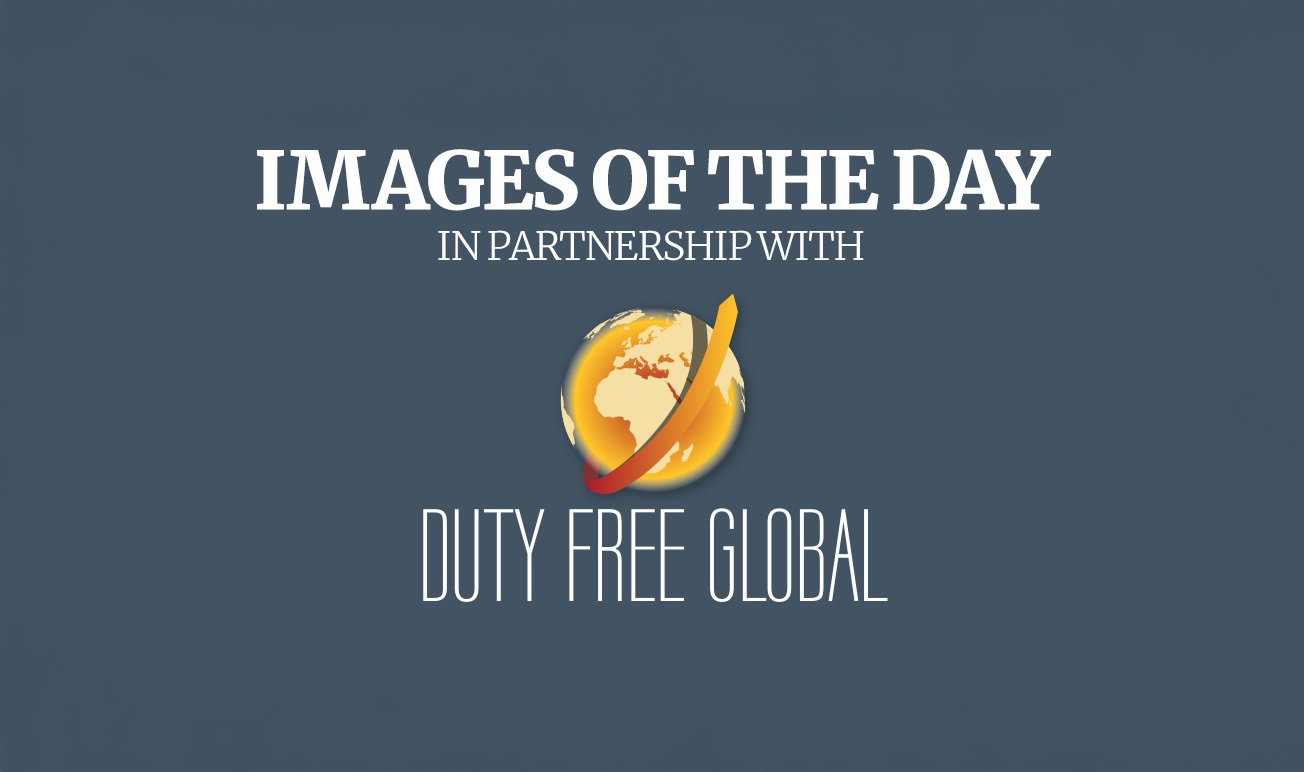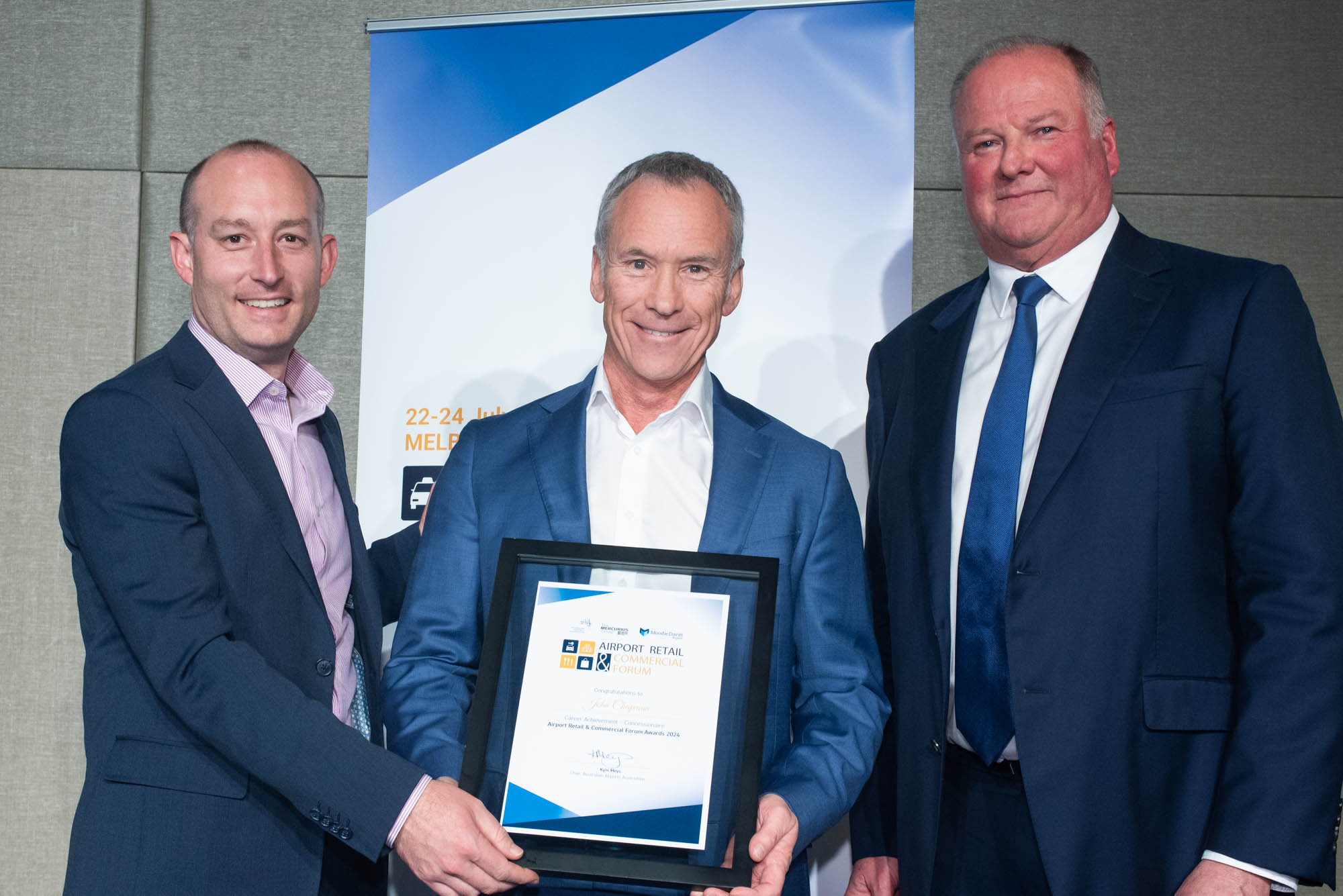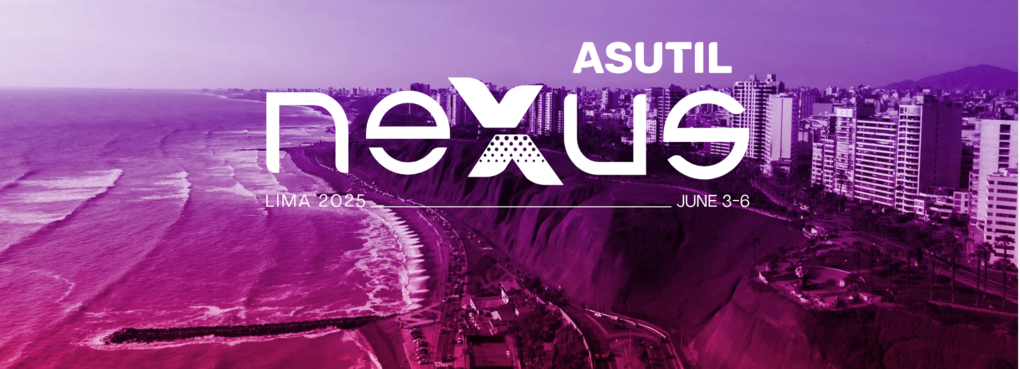
SINGAPORE. Welcome to our coverage of The Trinity Forum 2022 in Singapore as the world’s most influential airport commercial revenues conference made a welcome return on 1-2 November after a three-year, COVID-driven absence. The event was co-organised by The Moodie Davitt Report, ACI World and ACI Asia-Pacific and was hosted by Changi Airport Group.
Below you will find snapshots of the key conference sessions on 1 and 2 November, alongside memorable social event highlights. Our coverage is supported by our Platinum Partners China Duty Free Group, Diageo Global Travel, L’Oréal Travel Retail, Mondelez International World Travel Retail, Nestlé International Travel Retail, Pernod Ricard Global Travel Retail and Shiseido Travel Retail.
WEDNESDAY 2 NOVEMBER
20:00 Gala Dinner at Jewel Changi Airport
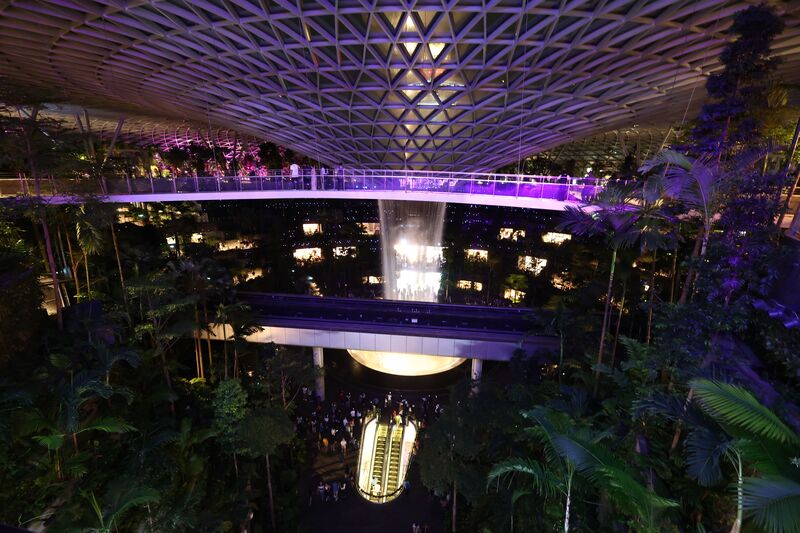


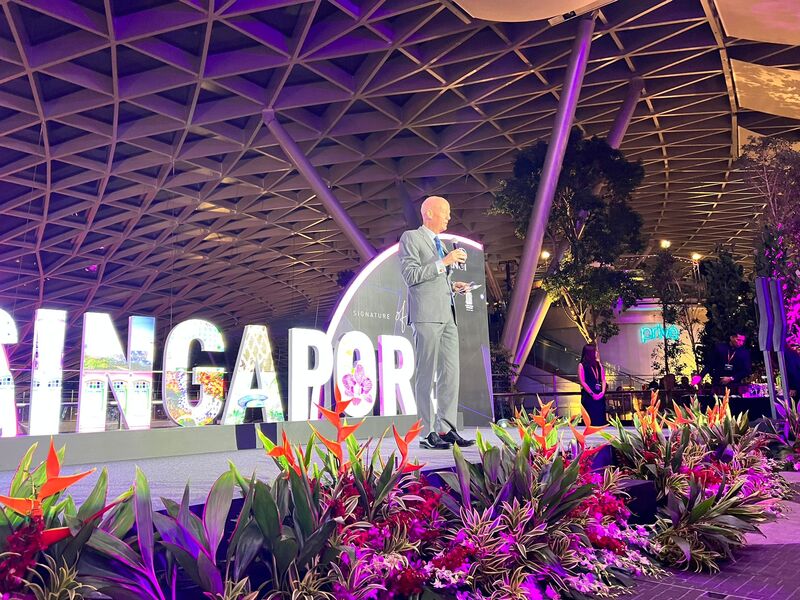
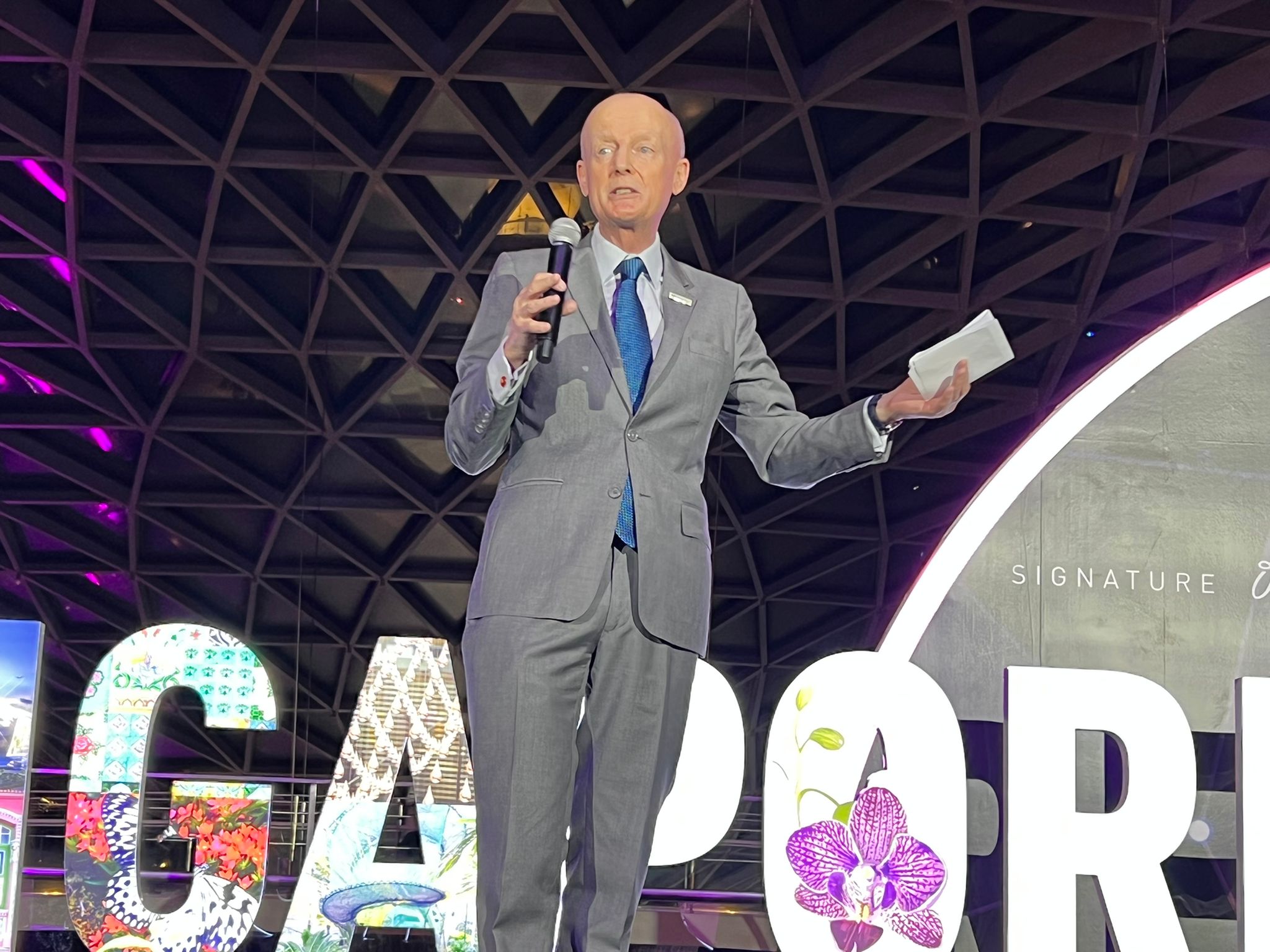



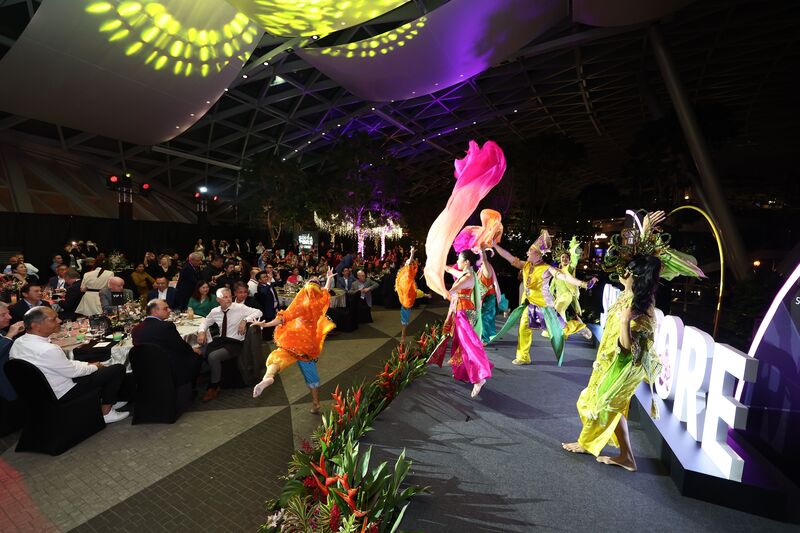
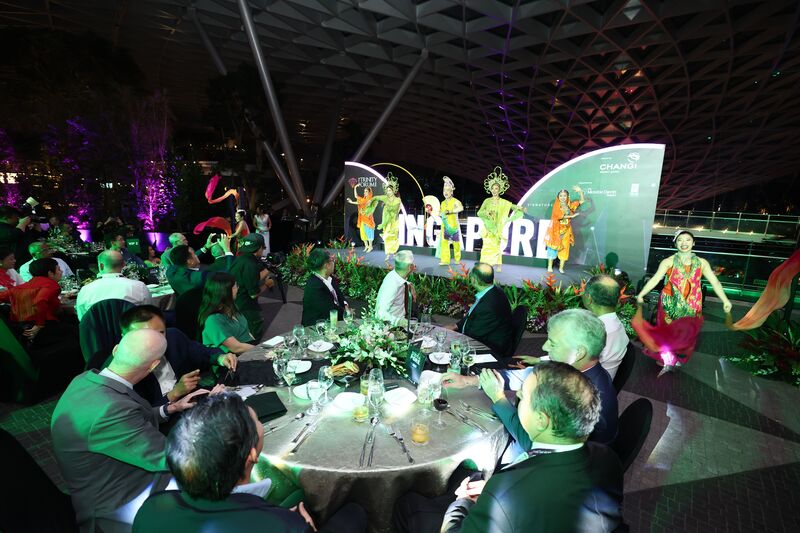
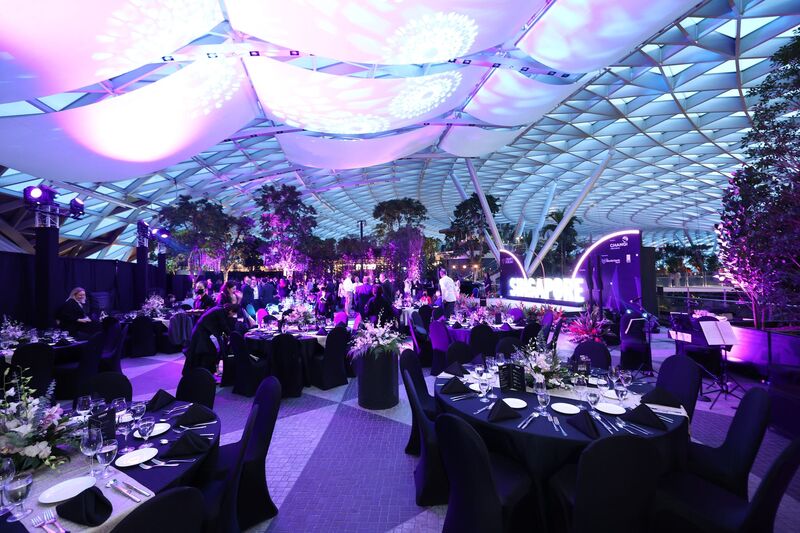

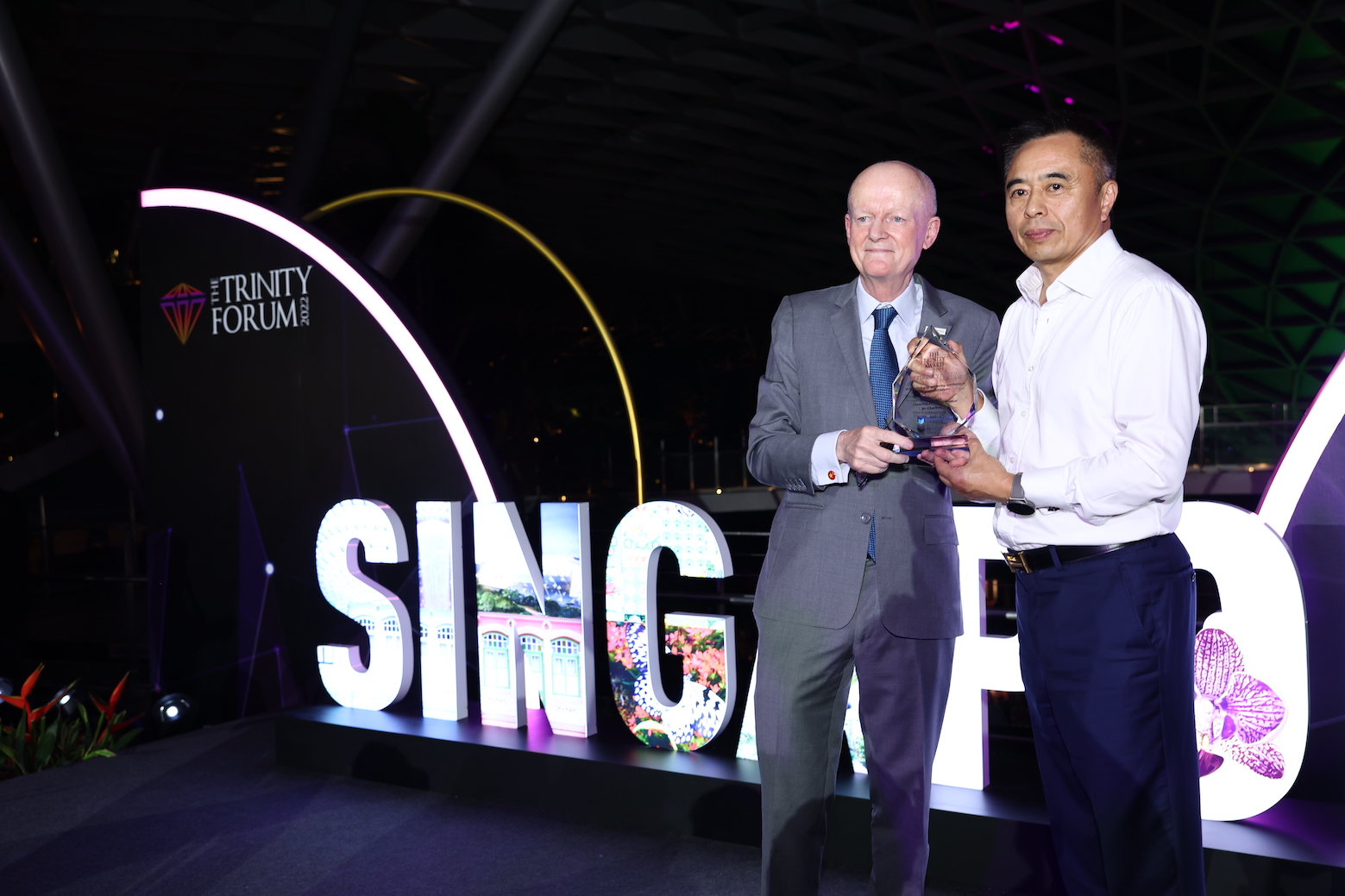
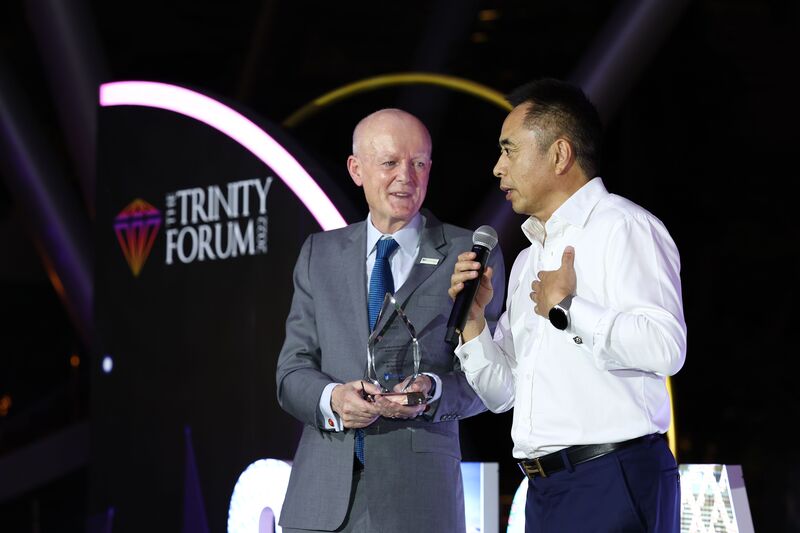

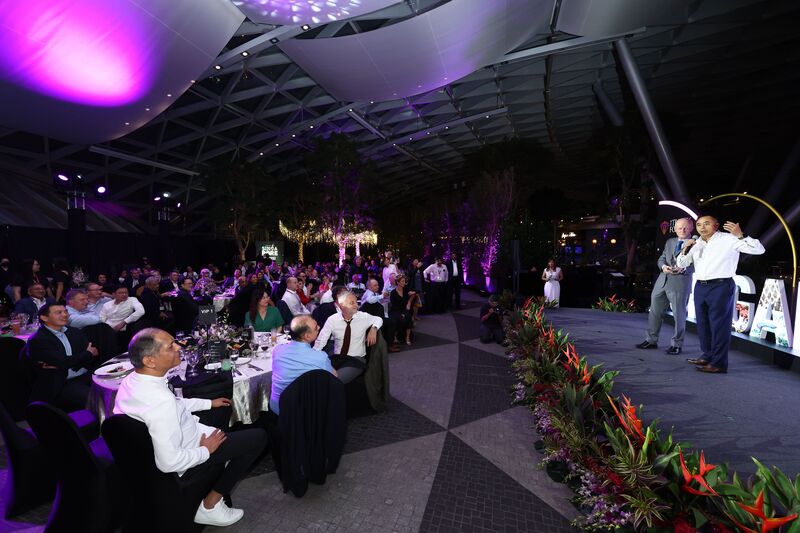




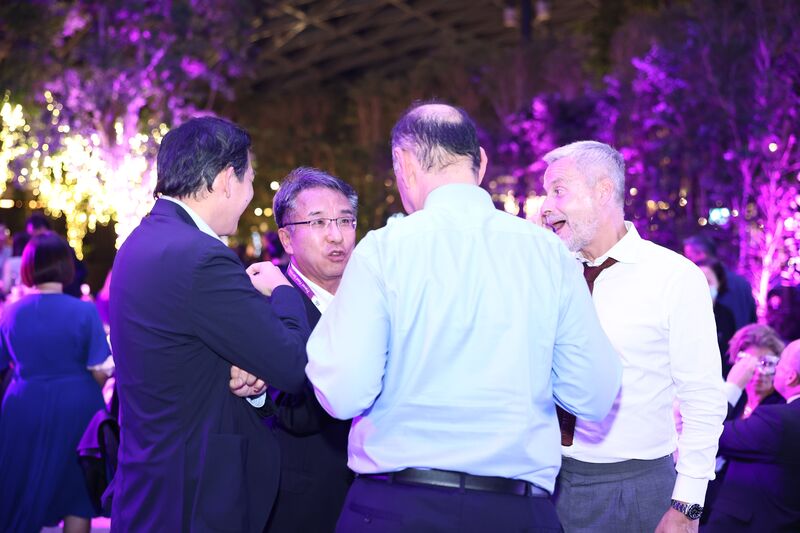

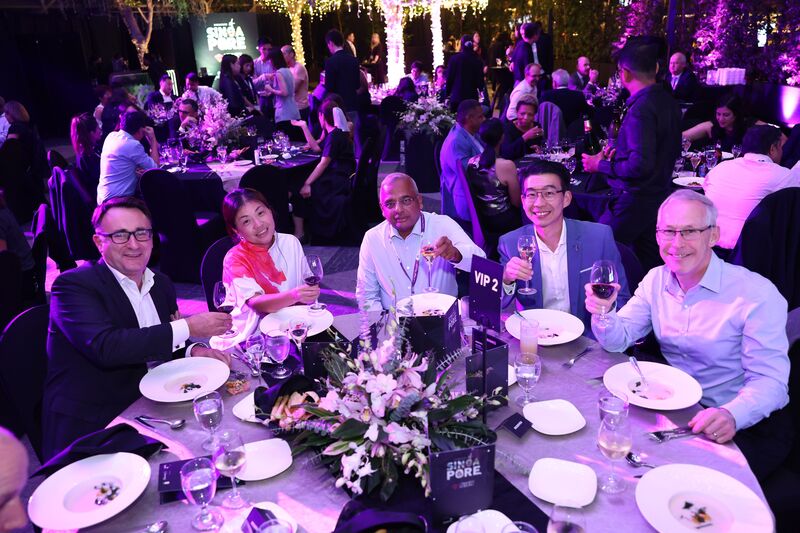
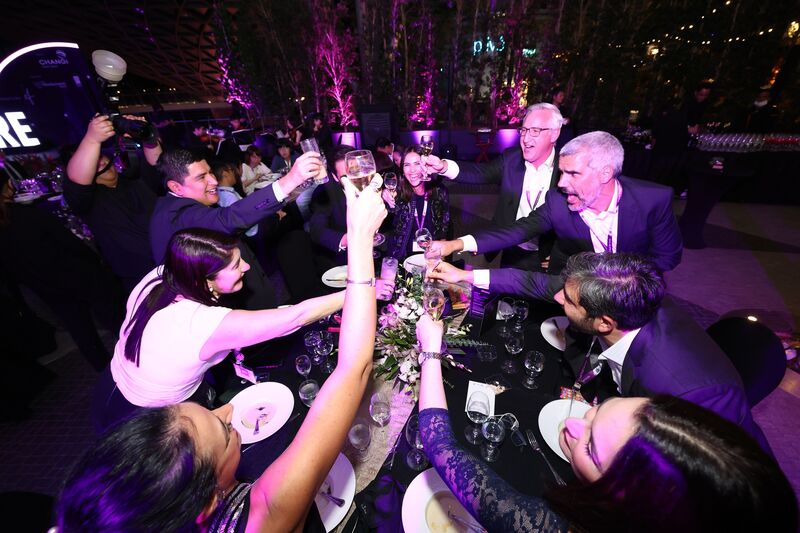
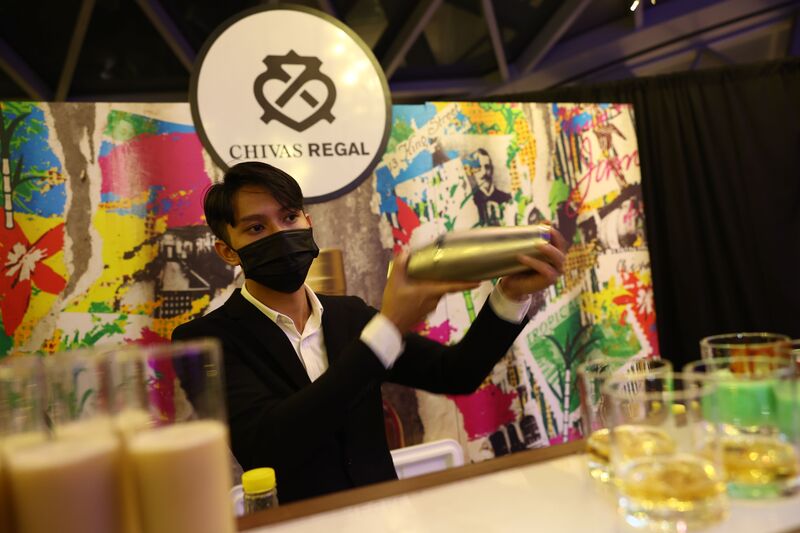



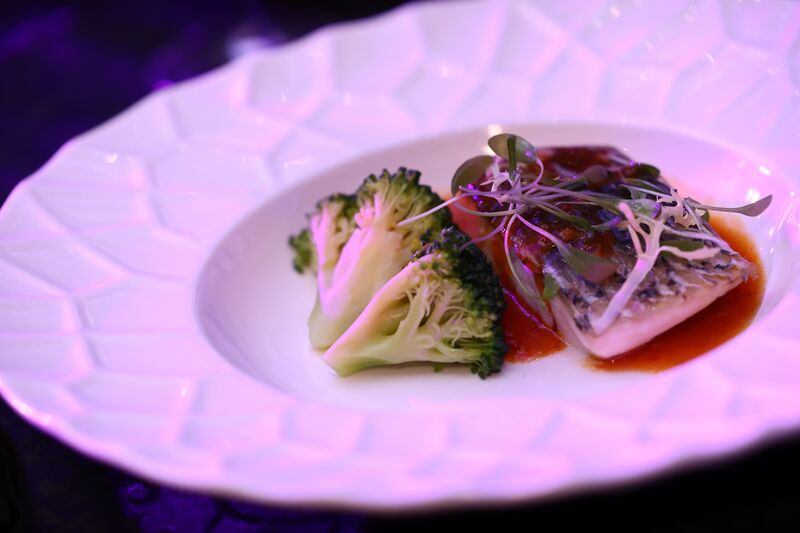
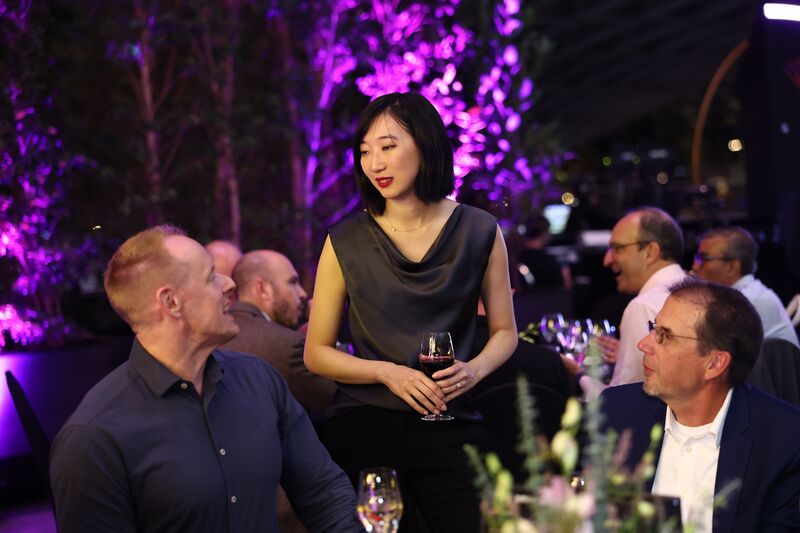
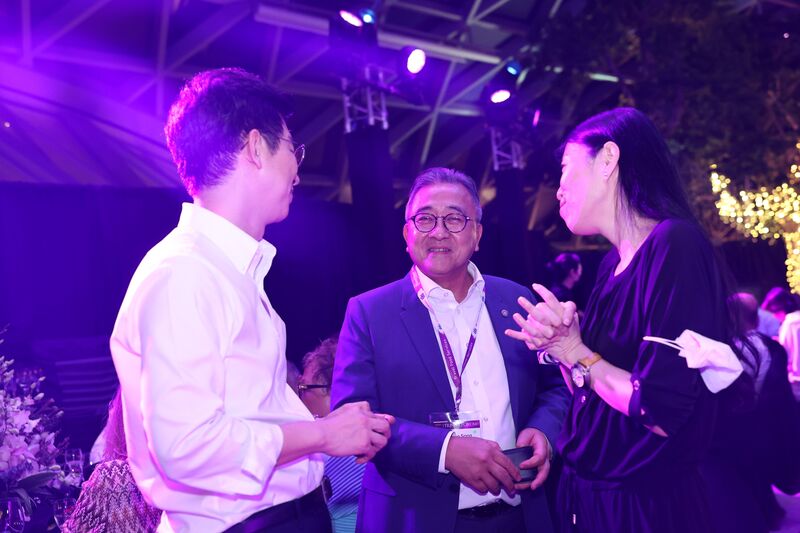
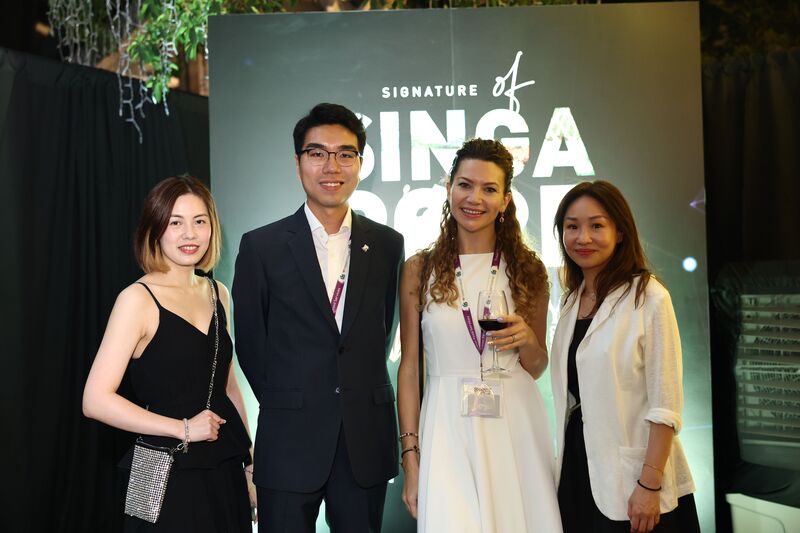

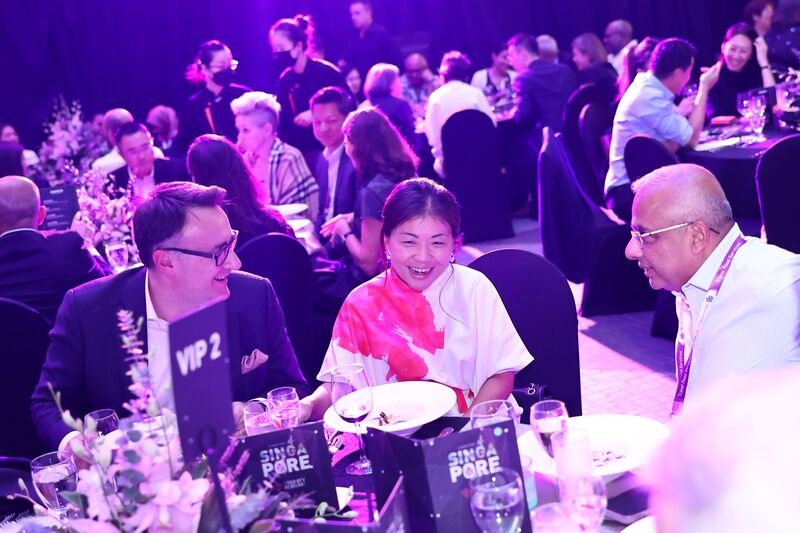

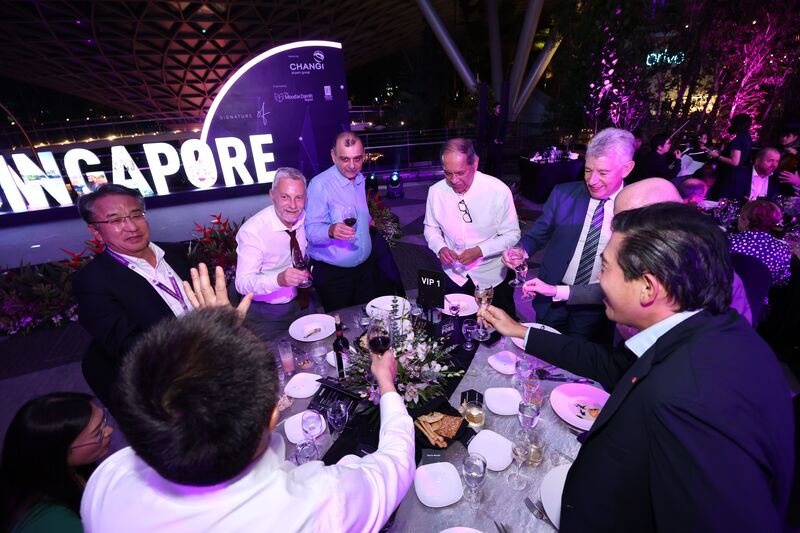
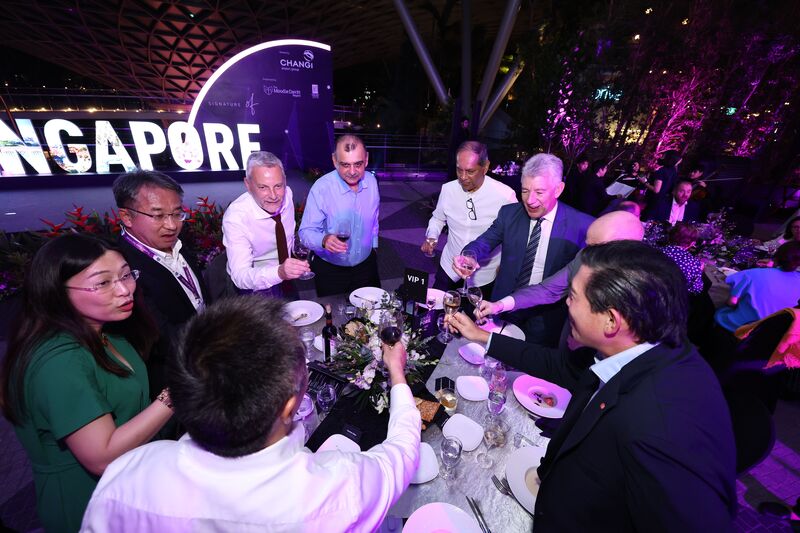

17:45 Reflections
The Moodie Davitt Report Founder and Chairman Martin Moodie thanked delegates for attending The Trinity Forum 2022, expressing his gratitude to the host Changi Airport Group, and co-organisers Airports Council International (ACI) and ACI Asia-Pacific, all sponsors, speakers and delegates.

Moodie said: “We’ve seen year in, year out, continuous support from some great friends in the industry. We finish on such a mighty high in terms of content, and with the genuine smiles from people who are happy to be back.
“20 years ago I created a brand called The Moodie Report, and later partnered with our now President Dermot Davitt to become The Moodie Davitt Report. We will be celebrating that achievement tonight.
“We have come through some tough times and seen good times too. Today is definitely one of the good times. We will celebrate next year’s Trinity Forum on its 20th anniversary in great style, with the location to be announced soon.”
The event concludes with the Gala Dinner tonight at Jewel Changi Airport, hosted by Changi Airport Group, with cocktails, spirits and wines provided by Pernod Ricard Global Travel Retail.
17:00 Taking Trinity to the Metaverse
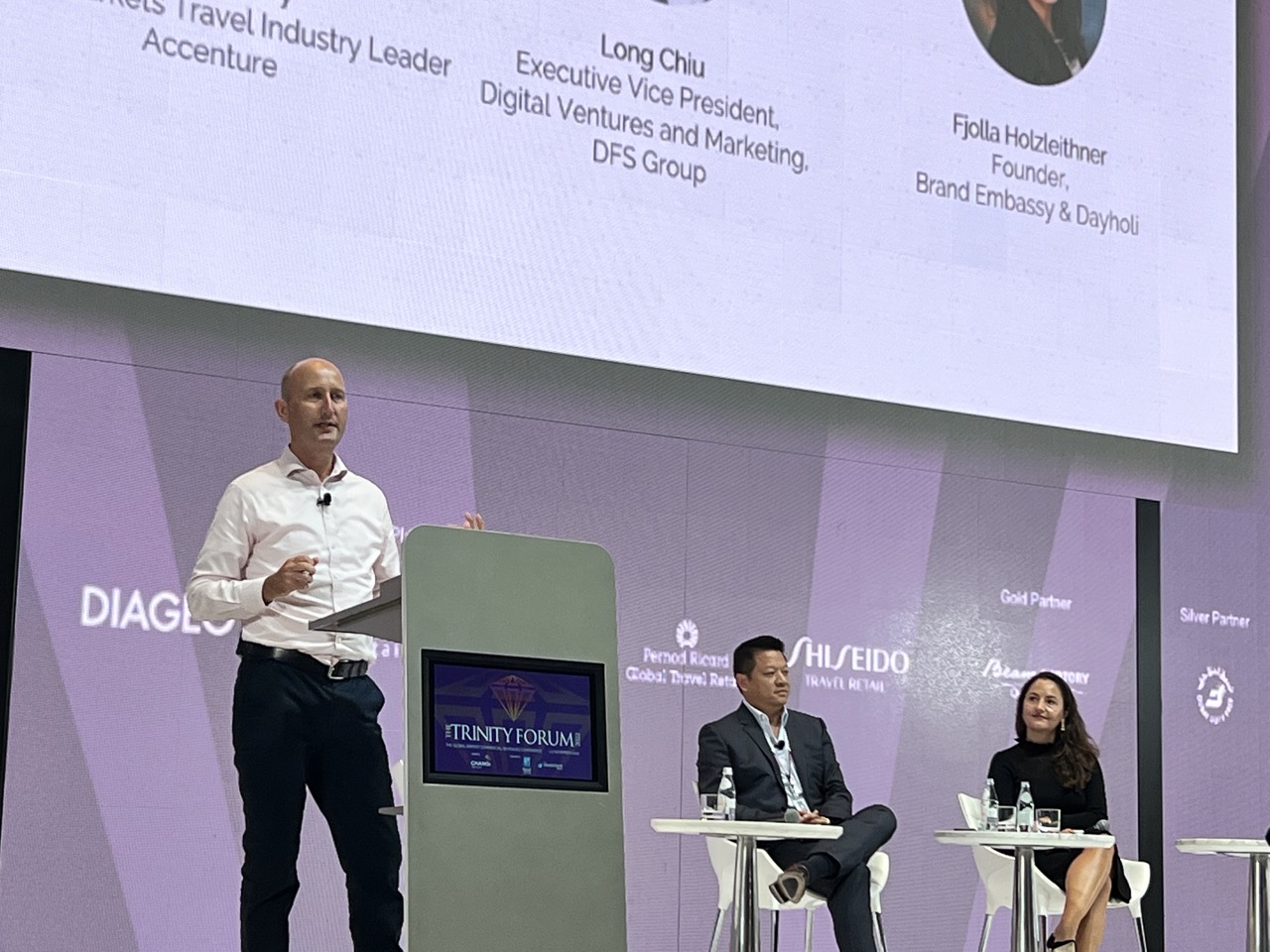
This excellent session explored how the Metaverse is redefining the possibilities for brand communications and commerce. It was expertly introduced and then moderated by Accenture Growth Markets Travel Industry Leader Mike Tansey. It also featured DFS Group Limited Global Marketing & Digital Ventures Executive Vice President Long Chiu and Trinity Challenge winner, Brand Embassy & Dayholi Founder Fjolla Holzleithner.


Tansey said: “The Metaverse is not the future, it’s the reality today. It already has 400 million users who spent US$54 billion in virtual goods. By 2024, the Metaverse is predicted to bring in US$800 billion in revenue.
“The Metaverse is the ‘Internet of Place’, a merging of the physical and virtual worlds,” Tansey explained. “It is redefining a borderless world. We believe it will revolutionise all aspects of life and business in the next decade. It will create new lines of business between customers and companies.”
Why retailers should embrace The Metaverse

Chiu explored what the Metaverse means for DFS Group and the wider travel retail channel. He highlighted exciting Metaverse use-cases from Louis Vuitton, Nike, Gucci and Balenciaga.
For Chiu, the Metaverse represents the next era of web. He said: “The Metaverse is a way for us to create and enhance a physical experience through the virtual space. The Metaverse can lead to gamified learning, communal activities and simulations which can lead to more immersive, ecommerce and shopping experiences.”
So, how is this relevant in travel retail? DFS Group recently launched its first-ever virtual universe – DFS World – in conjunction with the launch of its largest-ever Annual Beauty Campaign.
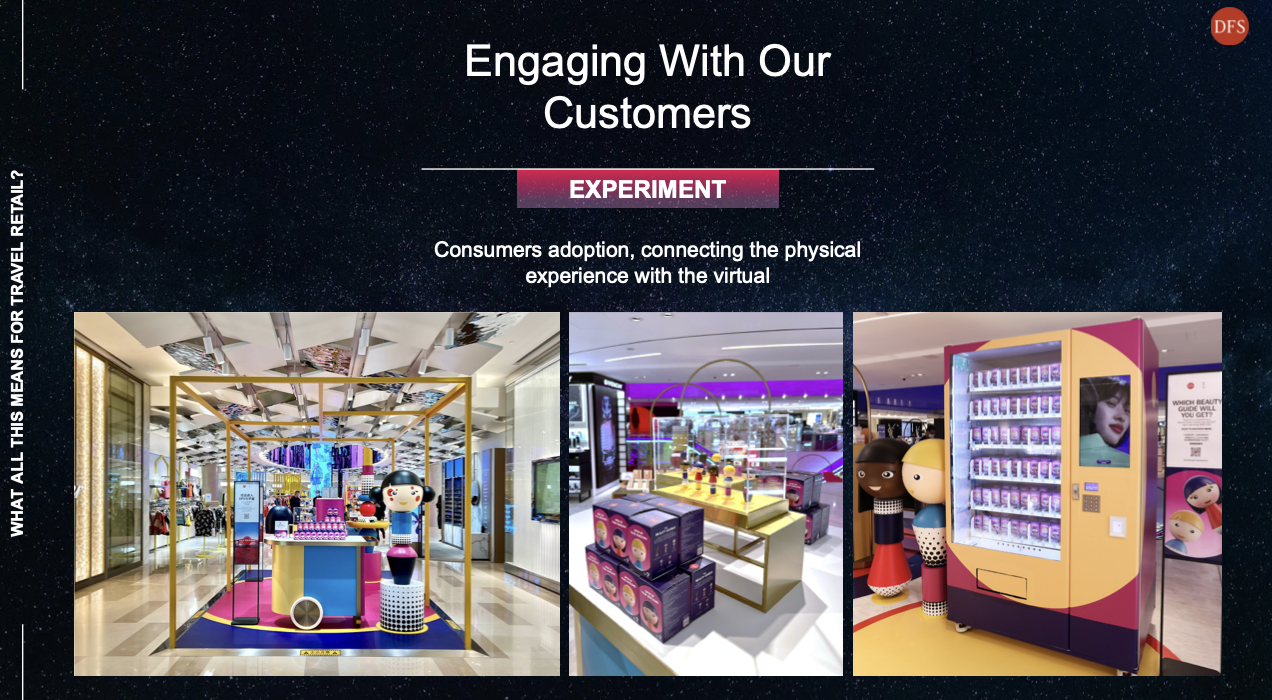
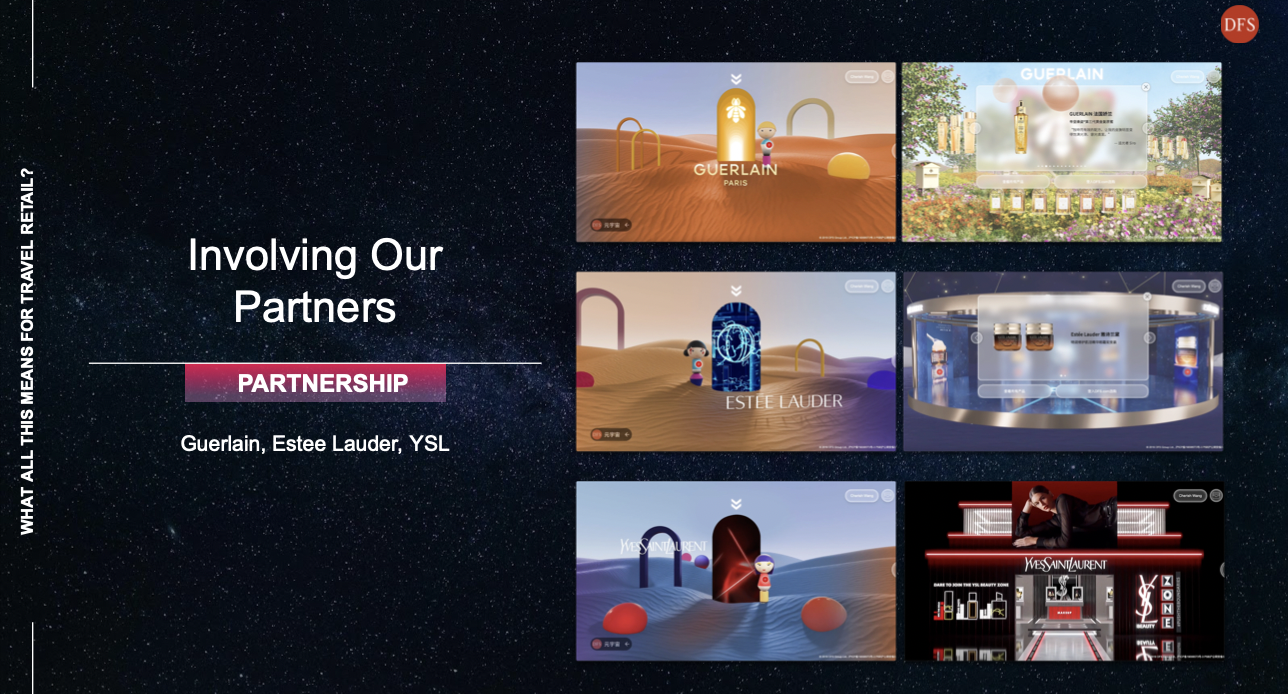
Throughout the campaign, customers were invited to explore the travel retailer’s beauty-themed Metaverse to capture exclusive DFS NFTs. They also discovered interactive experiences, displays and limited-time offers from their favourite beauty brands; and enjoyed an array of exciting in-store activations.
Chiu urged the Trinity to bring the Metaverse into the retail space. He said: “Retailers need to build Metaverse experiences that authentically and meaningfully engage with consumers. DFS Group is developing a strategy that is focused on generating value for our customers and partners. The virtual should be used to enhance the real and physical.
“We need to test initiatives, monitor results and refine the experience. We need to experiment and think about the Metaverse as a holistic consumer experience across the physical, digital and virtual world. Finally, we need to prepare to scale and embed the Metaverse in our business strategy and operating model.”

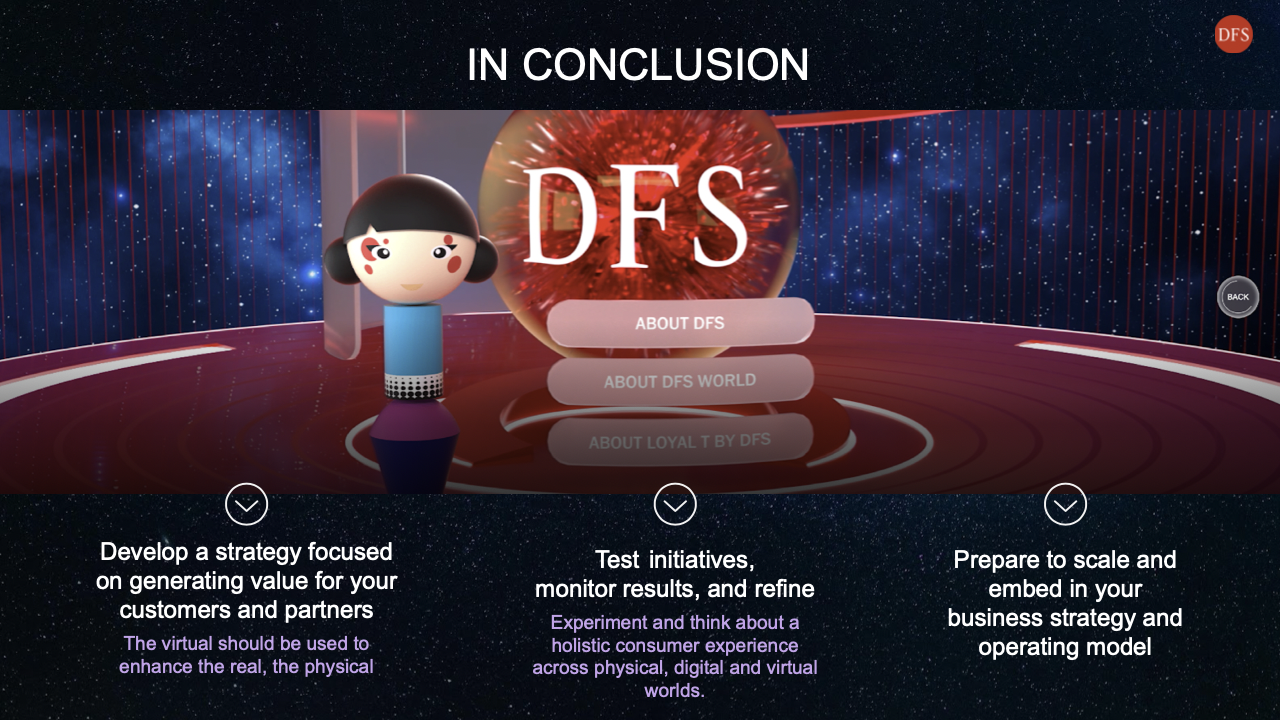
Holzleithner spoke further about the Metaverse, its benefits, the technologies involved and its use-cases in travel retail. She highlighted Dayholi’s latest virtual project with singer/songwriter Dua Lipa, which invited users on Metaverse platform Decentraland to play a game in the Metaverse and win real-life concert tickets.
She also discussed Madalia World, an excellent use-case for the Metaverse in the travel industry. Madalia World is a Metaverse that aims to be Madeira’s digital twin island. It is broken into land plots that represent real-life locations. It houses 500 unique virtual properties that can be bought in exclusive NFT formats.
Will the Metaverse erode travel? According to Holzleithner, definitely not. “I think the Metaverse will give people a sneak peak of the destination and inspire them to travel more.”
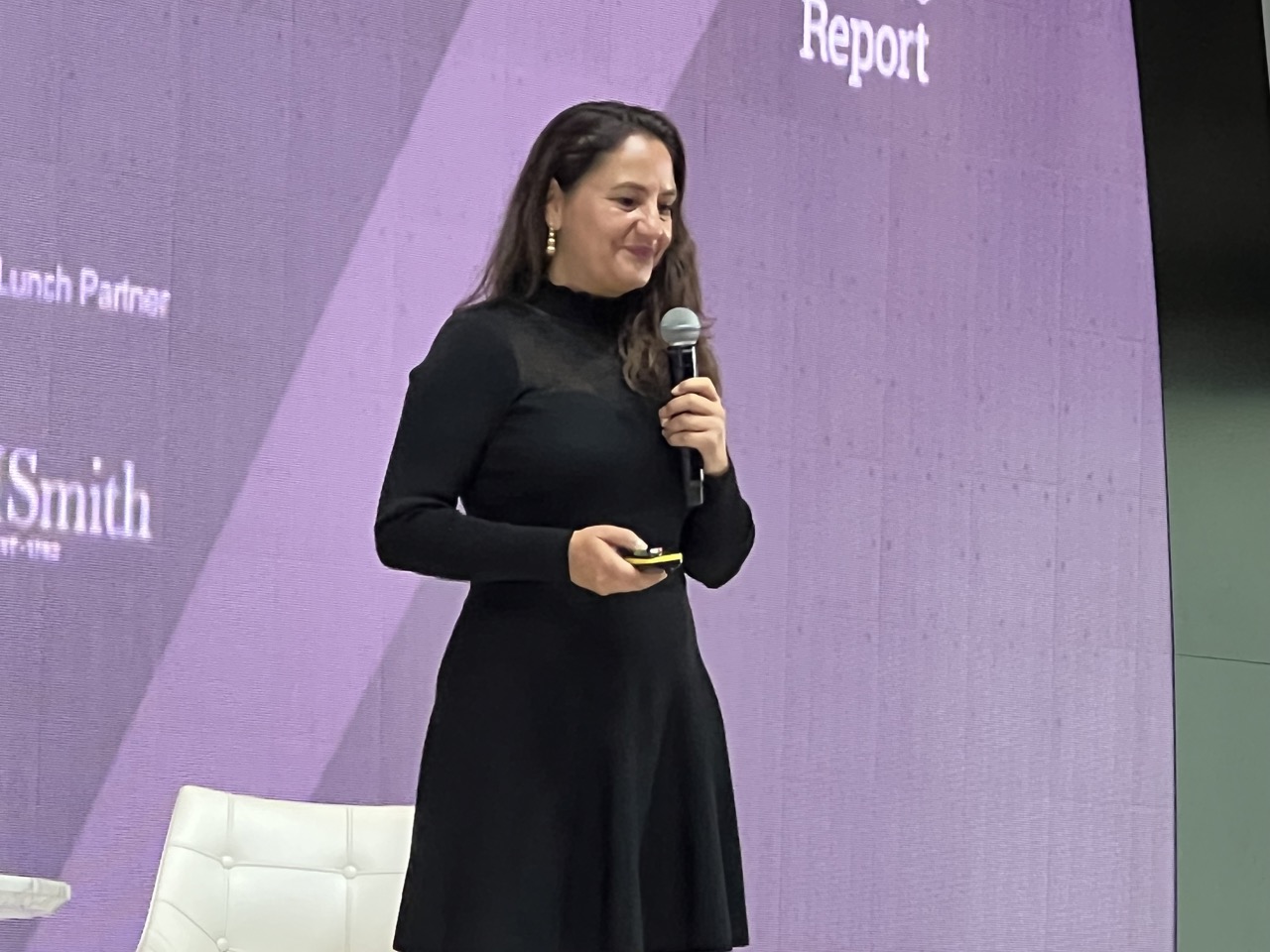
16:00: Driving Revival Through Investment and Innovation
Investment and innovation were key topics discussed during a key session involving two major airports and a leading travel retailer.

The moderator of the penultimate session was ACI World Senior Vice President Programmes and Commercial Services Antoine Rostworowski. A strong line-up featured three speakers: Dallas Fort Worth International Airport (DFW) Vice President of Concessions Zenola Campbell; Dubai Duty Free Chief Operating Officer Ramesh Cidambi; and Greater Toronto Airports Authority (GTAA) Strategic Partnerships & Digital Business Associate Director Tina Williams.
Campbell highlighted the fact that DFW is the second-busiest airport in the world and number one in the US in terms of non-stop destinations.

She said: “We came out of the pandemic much faster than other airports in the North America area. We see employees being key in terms of coming out of the pandemic and we launched a Growth and Partnership (GAP) programme in response to this. We also implemented new digital technology to keep staff motivated.”
Campbell said the airport needs to be an easier experience for passengers and some of its concessionaires are responding with concepts such as self check-out. DFW is also focusing on Customer Relationship Marketing (CRM) and enhancing its retail services through technology and customisation.
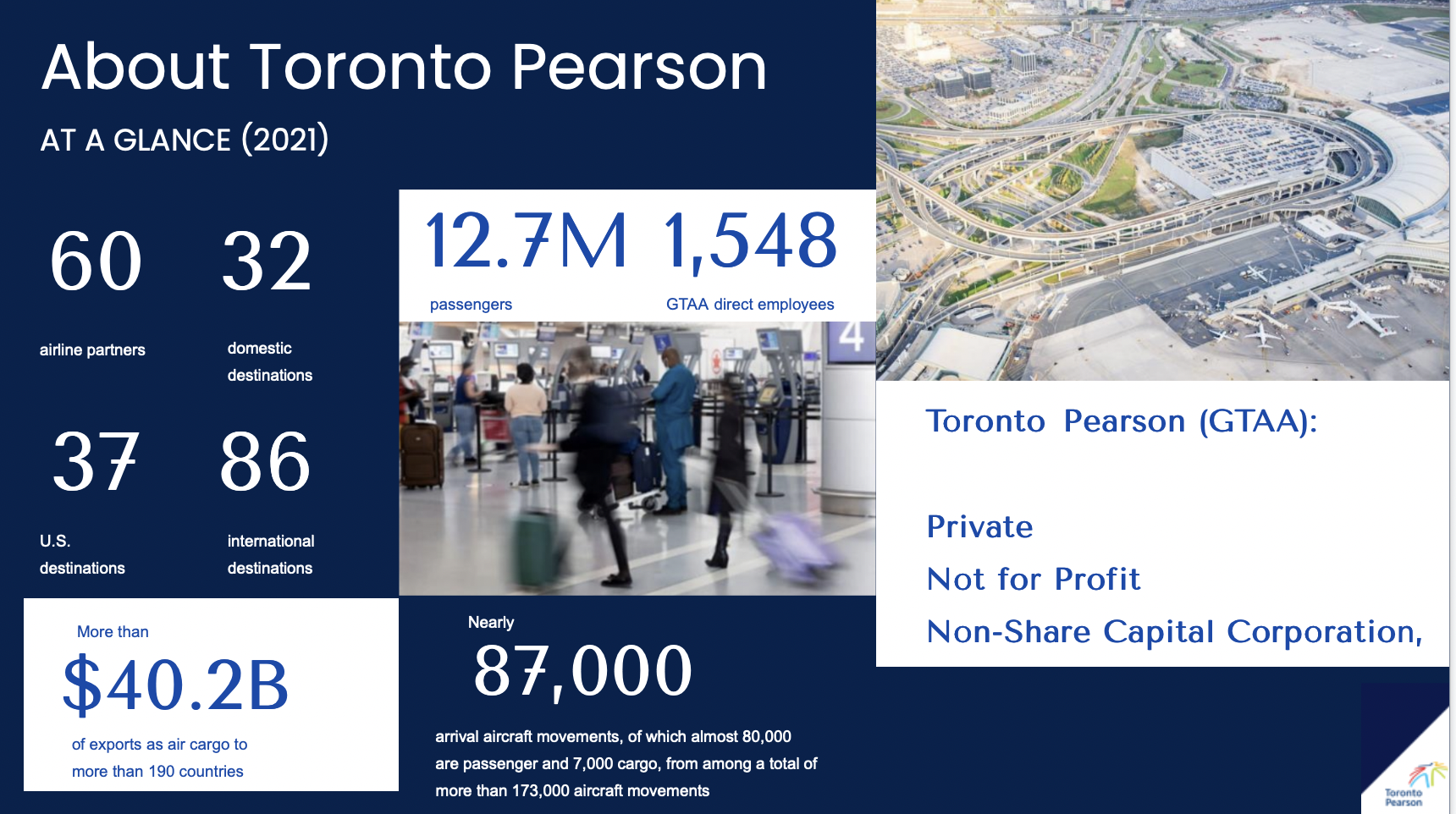
Williams said: “Although the pandemic certainly hit us we took this time to look at how we wanted to rebuild and move forward. Our vision at Toronto Pearson is to create jobs, cut emissions and set the global standard for passenger-friendly travel. My role is in strategic partnerships.
“In Toronto we are a hub for new technologies and the second economic driver for economic growth. Looking forward, we look to be the world’s most-connected airport and nurture those partnerships.”

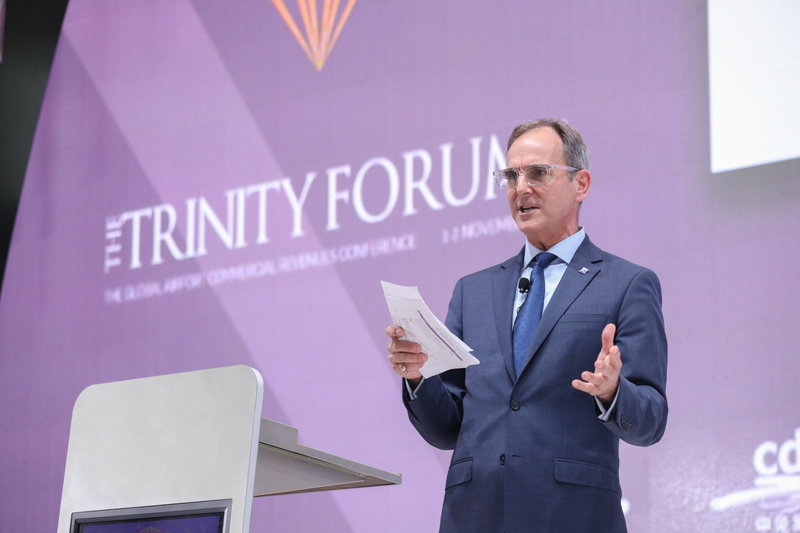
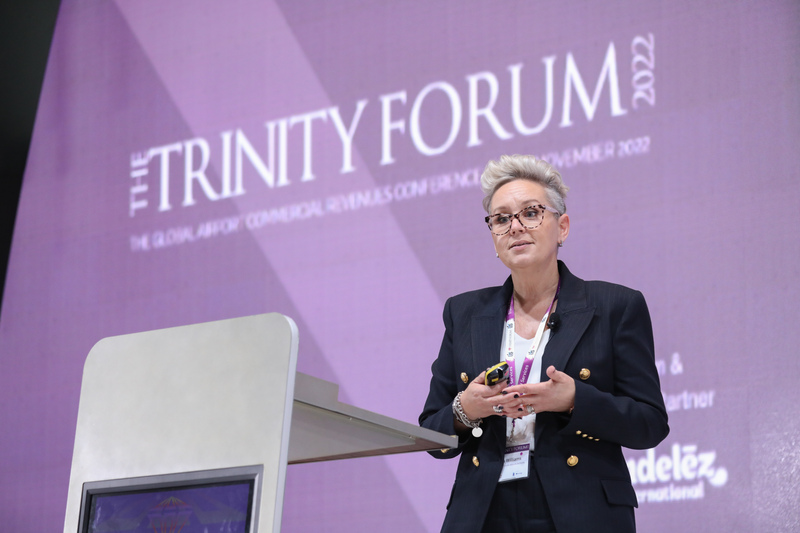
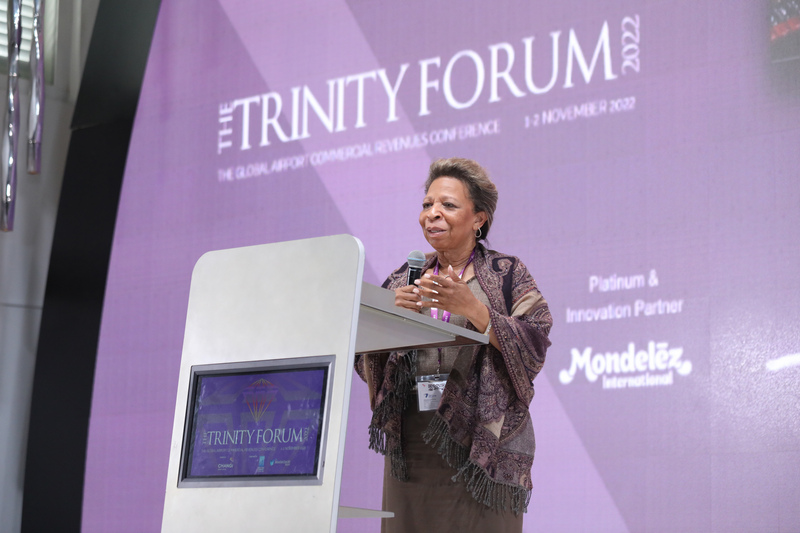

Cidambi delivered a highly detailed and relevant presentation about the latest traffic, category and spending trends in Dubai. He said: “Recovery really picked up steam as the months progressed. The trend has been extremely strong in the last few months. The story is good in terms of regional dispersion in spite of the China lockdown, and we continue to do well each month.

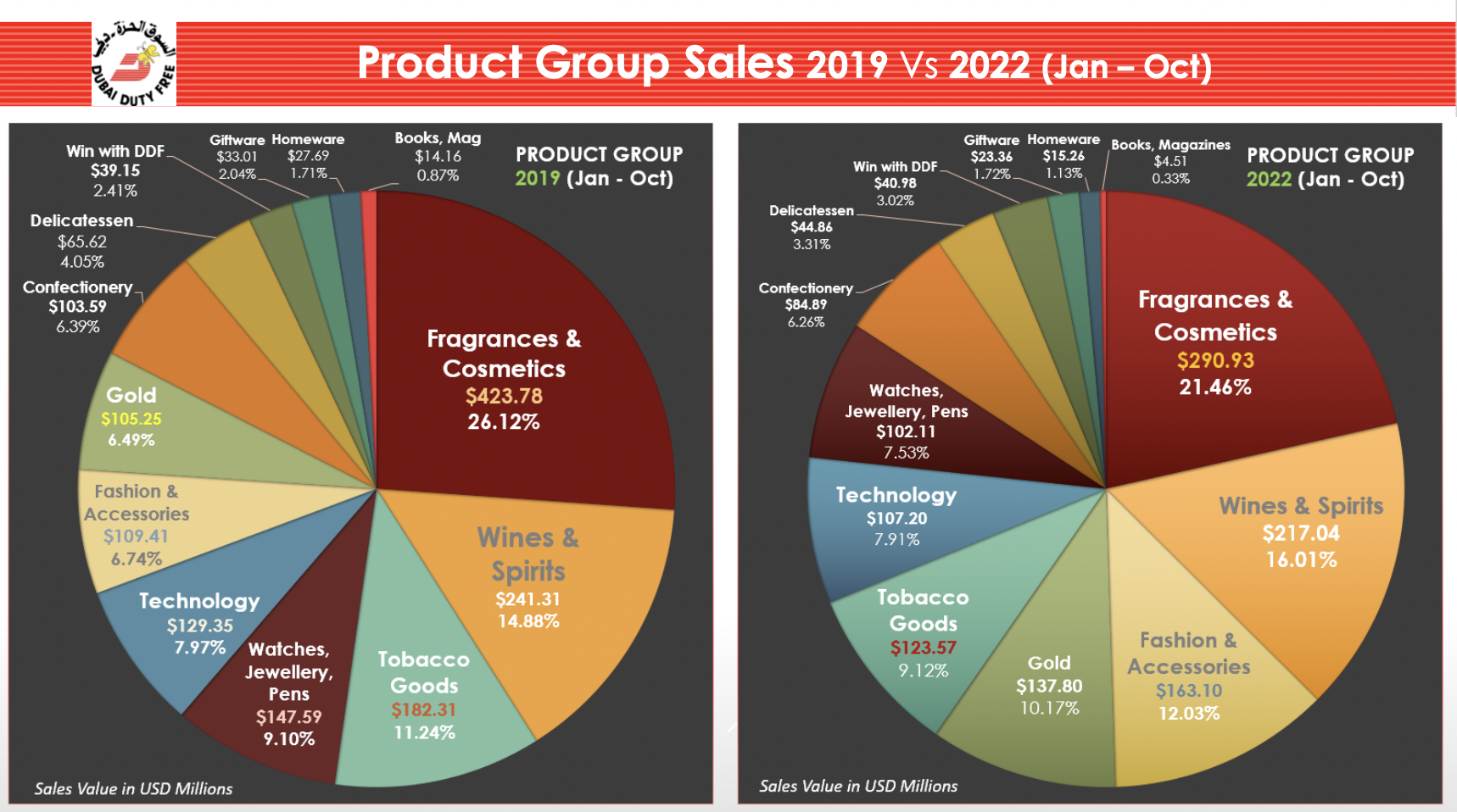
“Because of the absence of the Chinese passengers we lost a lot of market share in skincare. But we have grown our market in the fashion category.”
14:10 New Wonders of the Airport World
This fascinating session explored three extraordinary and exciting projects from three airport companies determined to raise the consumer offer to a whole new level. It featured Airport Authority Hong Kong (HKIA) General Manager Retail & Advertising Alby Tsang; Noida International Airport Chief Operating Officer Kiran Jain and Qatar Duty Free Vice President Operations Thabet Musleh.
A real spirit of investment at Hong Kong International Airport
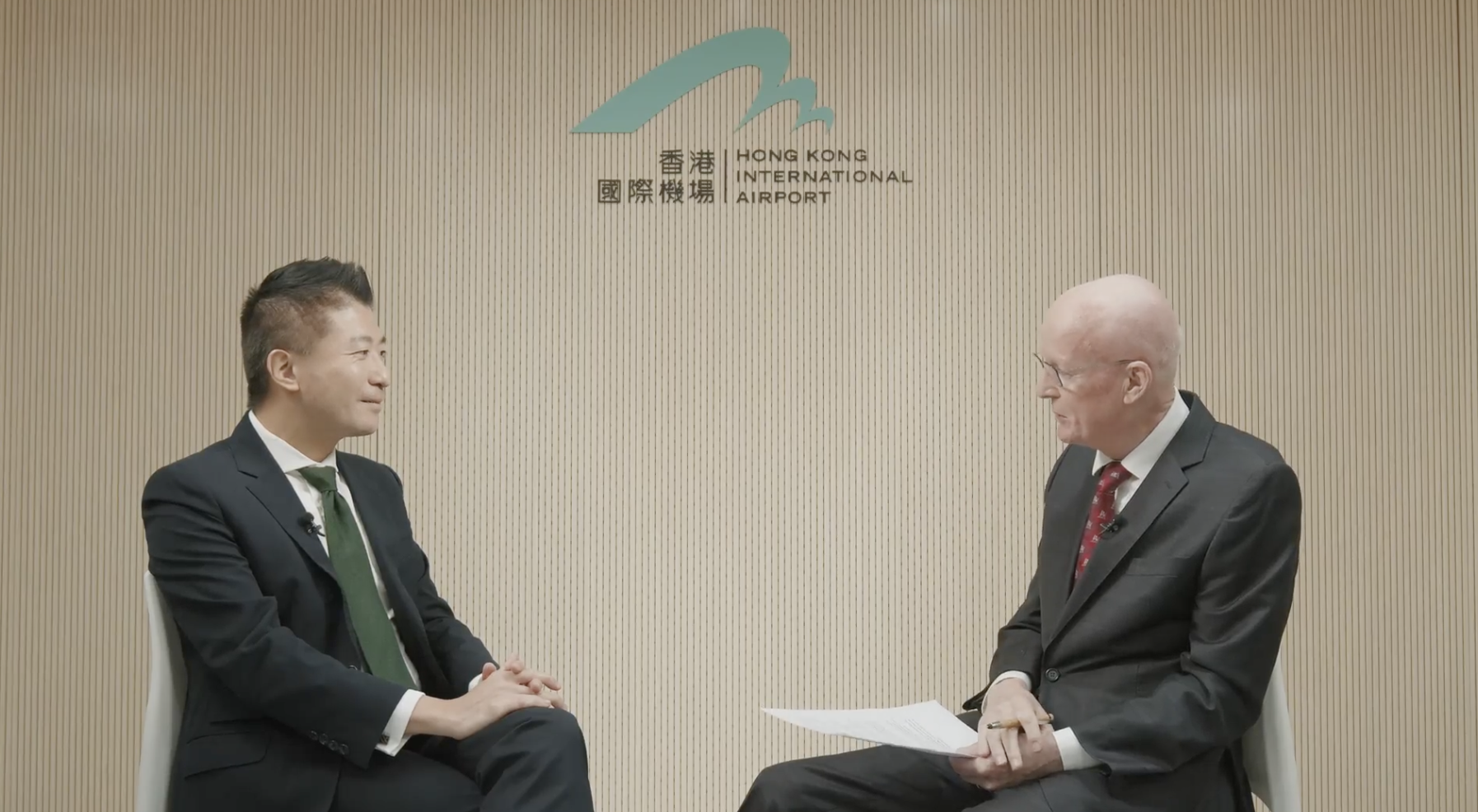
In conversation with Martin Moodie, Tsang discussed how Airport Authority Hong Kong (HKIA) has been preparing for the recovery of travel. “HKIA had been one of the busiest airports, but COVID had brought unprecedented challenges. However, we are confident that people would travel again. This is why we have kept investing these past couple of years.”
HKIA renovated its existing terminal, built a third runway, built a new Terminal 2 and progressed its ‘Airport City Vision.’ It also launched e-boarding gates, set up three multimedia zones and built the world’s longest airside bridge which connects one satellite concourse to the main terminal.
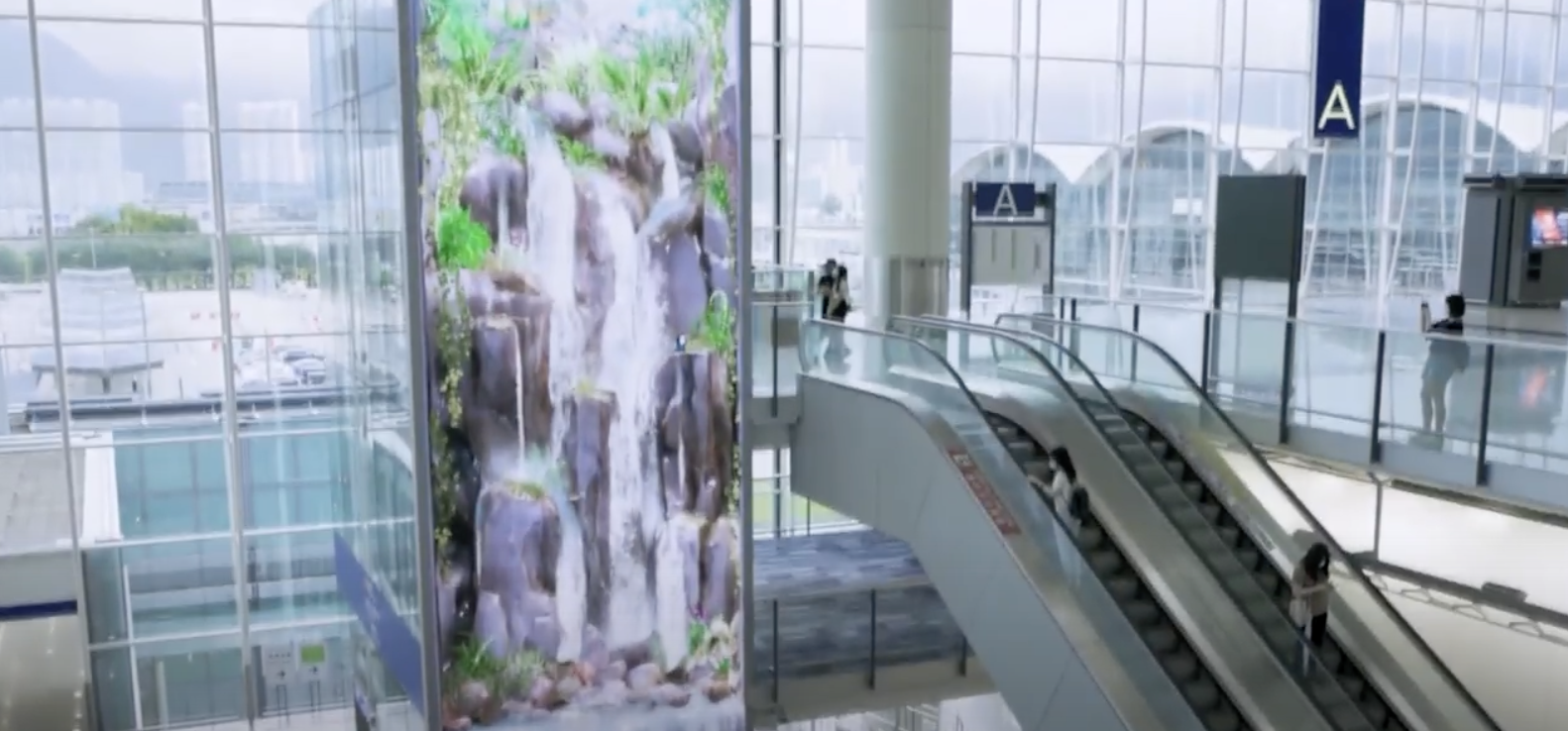
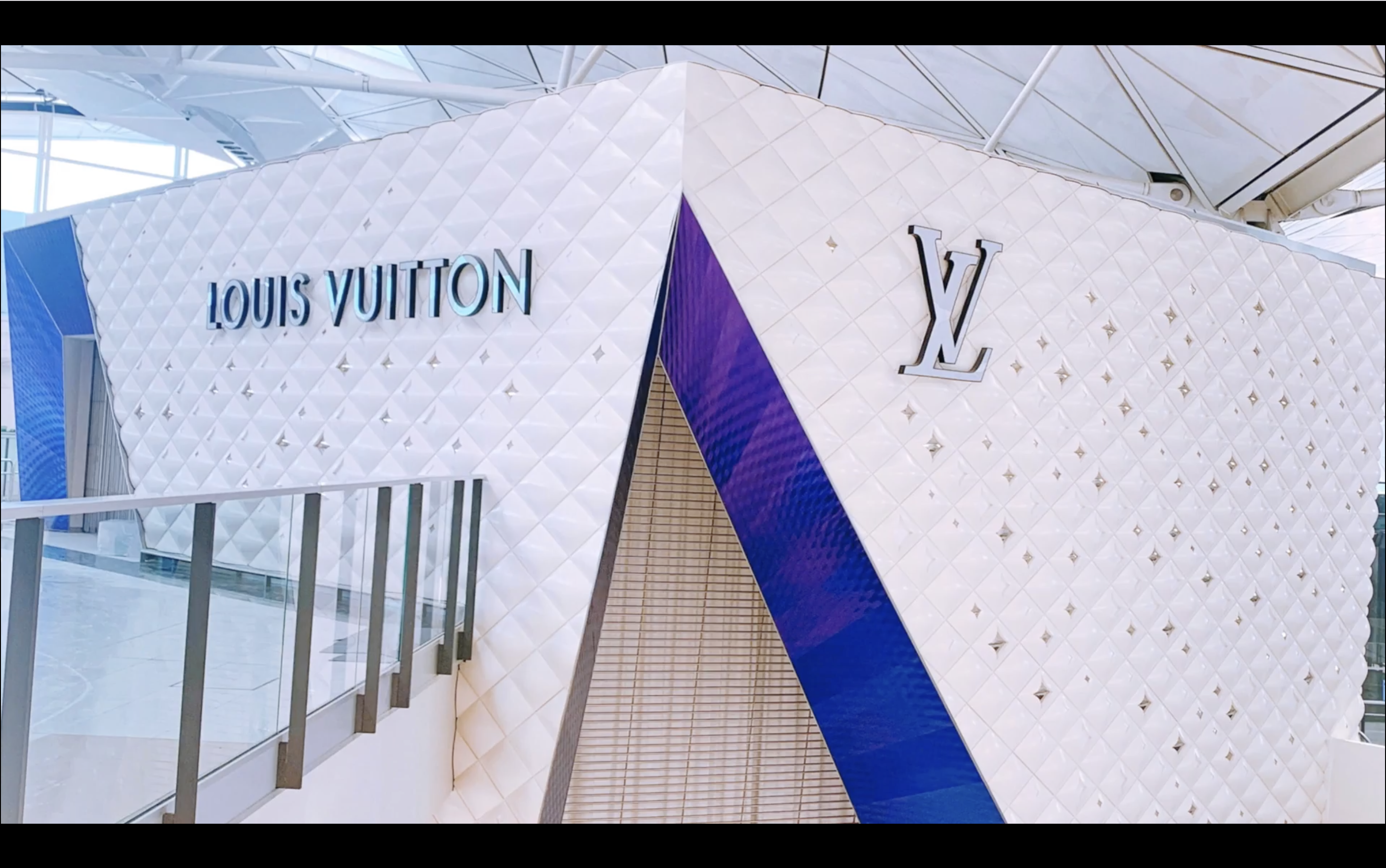
Importantly, HKIA refurbished its luxury retail zone which is home to 40 top-tier luxury brands. Chanel, Louis Vuitton and Hermès have also finished their new duplex stores.
Speaking about HKIA’s Airport City Vision, Tsang said: “Besides developing our core capabilities in passenger and cargo traffic, the Airport City Vision sees HKIA as not merely a city airport but as a destination for Hong Kong and the Greater Bay Area (GBA).
“These past few years, our development has extended beyond the traditional functions of an airport. While we continue to operate our airports efficiently, we are expanding our functions in commercial, entertainment, exhibition and many more. Our ultimate goal is to transform HKIA into a new landmark and become an economic growth engine for Hong Kong and GBA.”


Sky City is a key element of this vision. It is a mega-scale, 25 hectare commercial development centred around an exciting new commercial development called 11Skies. 11Skies aims to become Hong Kong’s largest retail complex for dining, shopping and entertainment. It will house over 800 shops, 150 dining concepts and 570,000sq ft of entertainment facilities. It also houses office towers and hotels, some of which are already in operation.
Noida International Airport: A confluence of Swiss efficiency and Indian hospitality

Jain previewed plans for Noida International Airport, an exciting new Greenfield airport project in Delhi. She also underscored the potential of India’s aviation industry, which grew by +15.4% annually from 2004 to 2019.
According to Jain, Noida International Airport is in a unique position to leverage opportunities in India. “Once Noida International Airport is completed, it will be the first time that India will have a dual-airport system.”

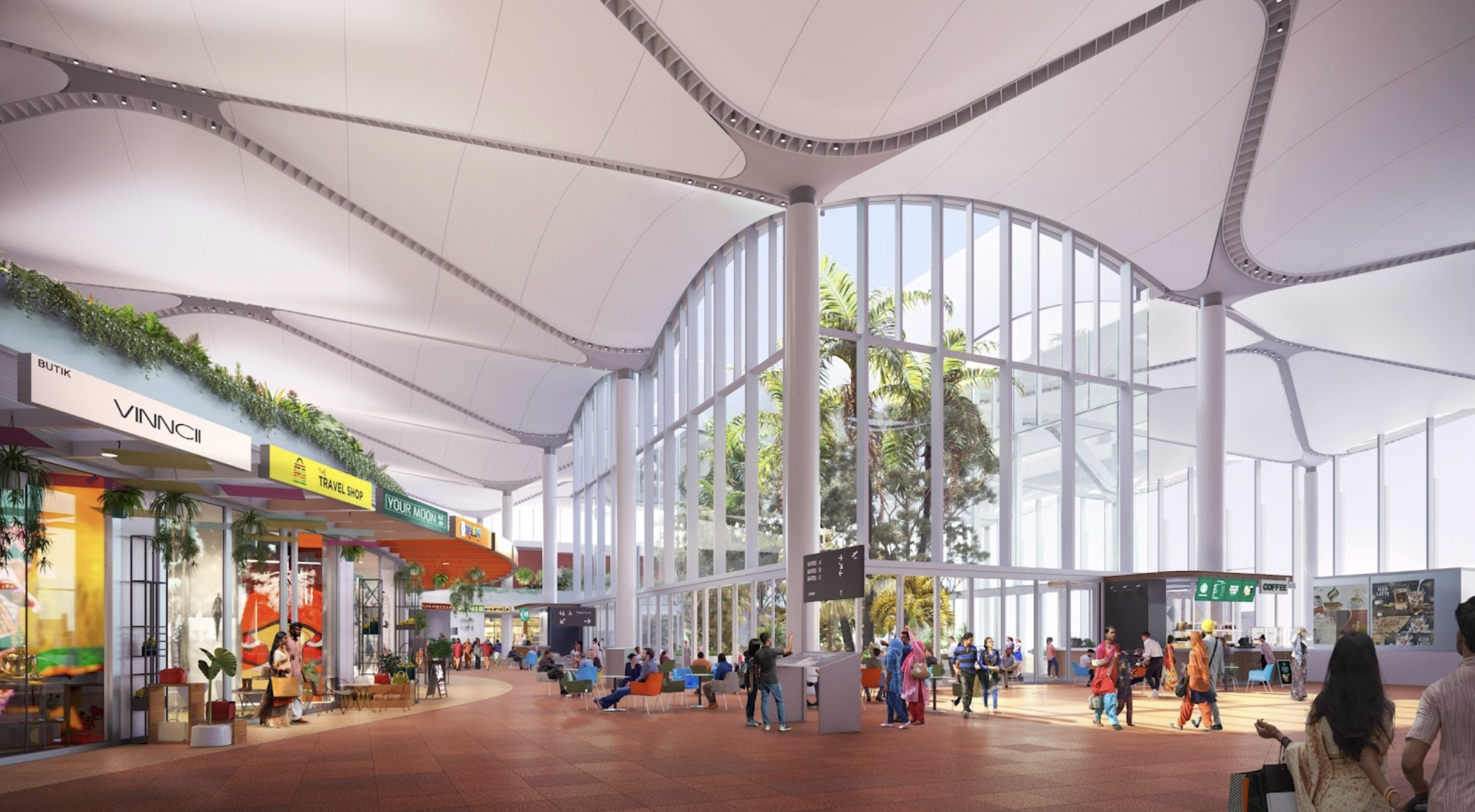
Noida International Airport is a 100% subsidiary of Zürich Airport Ltd, which has just invested US$760 million into the project. Noida International Airport plans to open Terminal 1A by 2024, which will welcome 12 million passengers. Once completed, the airport in its entirety will serve 70 million passengers.
“Our goal is to marry Indian warmth with Swiss efficiency,” Jain explained. “When we look for partners, we’re looking for magic in terms of efficiency, ethos and beliefs. While the pandemic was happening, me and my colleagues were stuck at home and designing a new airport for our nation. Over a period of two years, we managed to work with designers, architects and thinkers from around the world to create this amazing new airport. Opportunities are everywhere and there are no better opportunities than what India brings to the world.”

A new wonder in Hamad International Airport
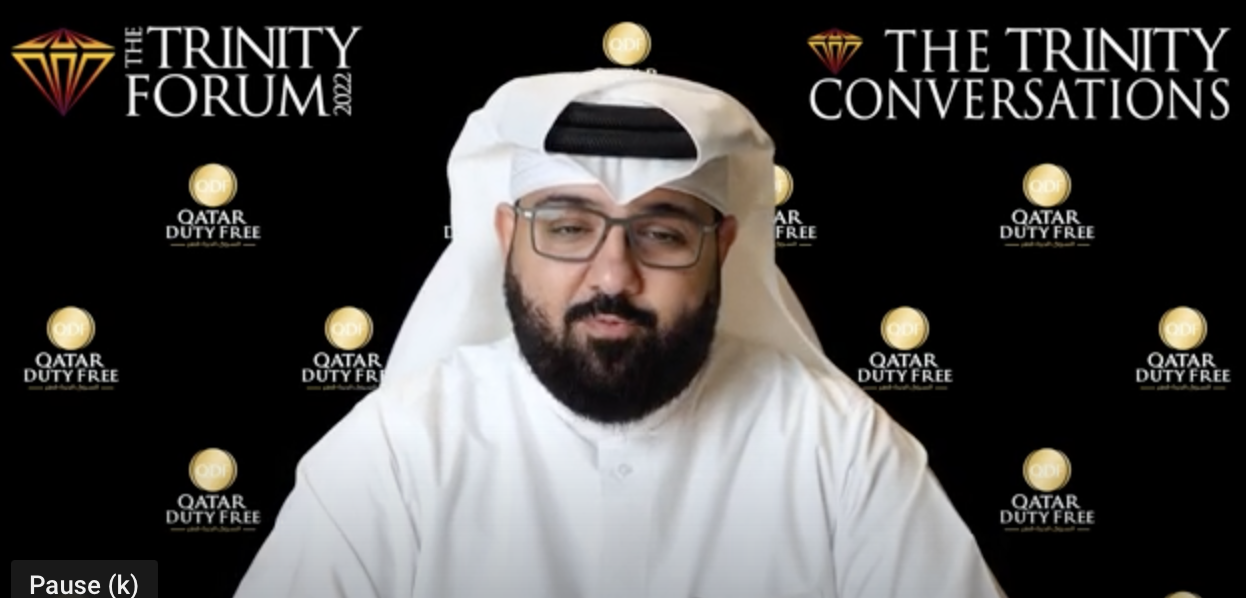
Qatar Duty Free Vice President Operations Thabet Musleh gave an update on the many developments happening in Hamad International Airport, which is preparing for the FIFA World Cup and a dazzling new expansion.
Commenting on the preparations for the upcoming FIFA World Cup, Musleh said: “This is the first time in history that a travel retailer is the official retailer for FIFA. We have 219 outlets across the stadiums, fan festivals and fan zones. It’s a new challenge for me and my team, there’s a lot to look forward to.”
Speaking about the expansion, Musleh said: “It’s the first time ever I’ve seen that brands are building better stores in an airport than in the domestic market. The sense of pride and excitement from our brand partners is unbelievable. It is all about tying retail back to experiences. We hope that our customers will recognise that and enjoy it.
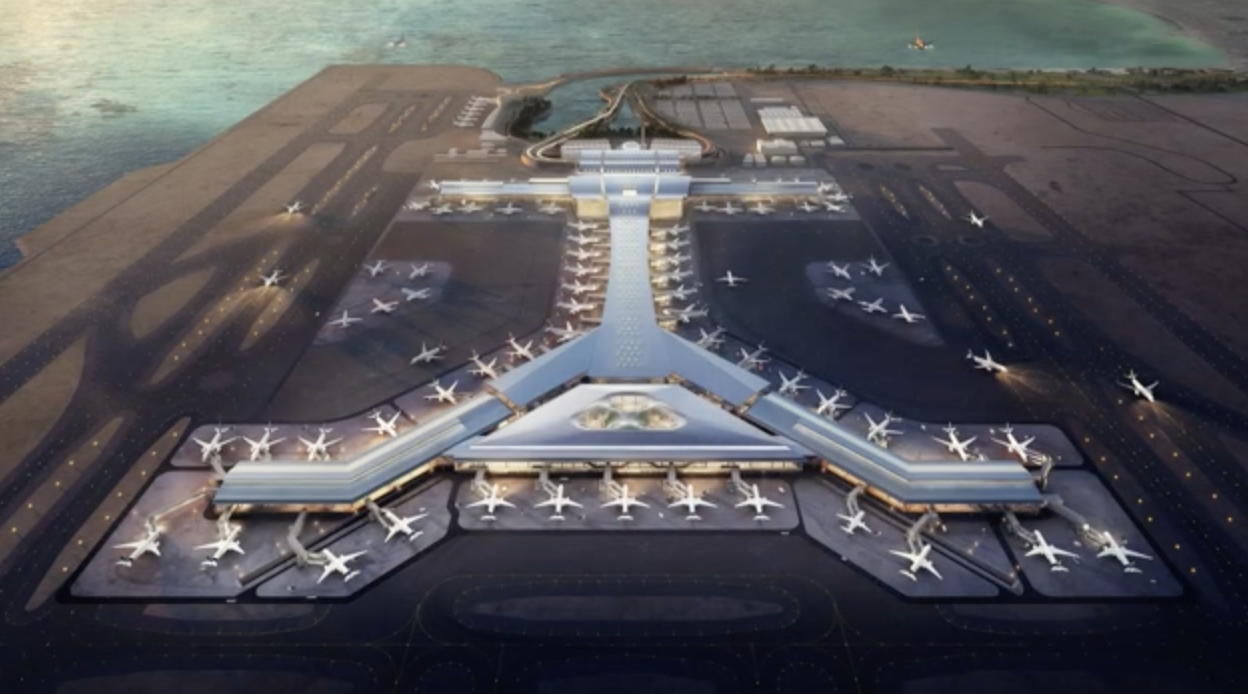

“We’ve moved away from the traditional F&B concept and tried to bring something very experiential and tailored to what the customer wants today. Luxury is a lifestyle and we’ve tailored our offer to that. We’ve taken it a little further and brought in some of the best local concepts available and created a new experience for our passengers.”
A different kind of Trinity in unfolding in Doha, which is all under the common ownership of Qatar Airways. “We’re not thinking in a Trinity mindset, we’re thinking in a Quaternity mindset,” Musleh said. “We’re bringing world-first concepts not just in travel retail but anywhere. Everybody is working towards delivering that excellent experience, there’s no question of MAG, space, sales per sq m or minimums. It’s all about delivering that memorable experience and everything else comes as a result of that.”
13:45: In conversation with Mathieu Daubert
After lunch, delegates heard from Groupe ADP Chief Customer Officer Mathieu Daubert, who spoke about Extime, the French airport company’s new retail and hospitality concept, managed through a series of joint ventures with key partners.

Daubert said: “Extime is a new brand for retail and hospitality aiming at transforming global airside zones into venues or Boutique Terminals. Like a boutique hotel, each terminal is different from one to the other but it will share our common values in design, service and in product offering.
“The Boutique Terminals have to be small with no more than six minutes to the closest boarding gate to keep passengers in “the out-of-time cocoon”. There is a strong integration between the commercial area and the departure lounge and we are creating three offerings: Lifestyle, Premium and Exclusive.

“Our implementation plans begin with Paris next year and after that we will look at international development with priority to the Groupe ADP airports. We have around 30 airports throughout the world. After that, if the opportunity arises, we will be pleased to deploy the franchise concept outside of the group.”
Groupe ADP will carry out a pilot project at Paris Charles de Gaulle Airport Terminal 1 in December, with further terminals to follow.
11:50: Enriching the Customer Experience
How can our industry become a truly consumer-centric market? And what can Trinity stakeholders do to truly enrich the customer experience in their journey? That was the question put in a session all around the travel experience and how it can be improved.
Alongside moderator The Moodie Davitt Report President & Editorial Director Dermot Davitt were three speakers: ACI World Director General Luis Felipe de Oliveira, Collinson President Asia Pacific and Global Board Member Todd Handcock and Spark Founder & President Heidi Van Roon.
De Oliveira said that the industry needs to make the airport space more attractive, use technology better and invest in training and capacity building. He urged stakeholders to invest in people who are capable of delivering on what the customer wants.

Van Roon said that the consumer wants to be heard and validated. In its recruitment, the industry needs to offer more meaningful employment and work-life balance to a demanding new generation of workers.
She said: “Many retailers do not understand this huge disconnect. We need to rethink the roles of our vital teams as they are the heart of the industry.
“Spark came into the industry around 2012 to build a staffing and recruitment firm that airports require. We have a lot of nuggets from that time that worked but the pandemic has decimated those careers. We have not provided line of sight for staff as we start to rebuild. That is a critical factor.

“We need to ask what is the USP of global travel retail. What can we offer that is not available in domestic markets? We must play that up in retail theatre, travel exclusives, building that experience beyond the retail location through pop-ups and lounges. We want to be imaginative and innovative and meet the customer where they are at.
“We want to focus on differentiation. The more we can integrate that into our teams to make that magic happen, the more we will realise those synergies and bring it to life. We have to be cautious of selling vanilla. That is a threat in travel retail, casting the net wide.
“Where pricing is not competitive we have seen interesting scenarios taking place where customers are getting verbally aggressive about products, services, and information that is too basic and not unique to them. 90% of our customers are holding a device in their hand and they want to have a reason to shop and it needs to be motivating to them. We have to upscale our sales teams to manage that conversation and ultimately build the brand, because the consumer is shopping the brand.”
Todd Handcock, who joined the discussion via video, said: “We are continuing to invest in experiences for travellers and seeing a lot of interest in different demographics engaging in various ways. Right now consumers have been conditioned by the Amazons and Apples of the world and that is the bar that has been set.”

Handcock said a good example of breaking down silos to unlock industry potential was the agreement between Inflyter (in which Collinson is an investor) and 3Sixty Duty Free to enable domestic travellers to shop online and have their order delivered to any US address.
10: 55 Brand perspectives: How to delight the consumer and drive sector growth

As travel retail emerges from the pandemic and recovery accelerates, how are the world’s leading brands reshaping the travel retail channel?
That question was put in a session moderated by The Moodie Davitt Report Founder & Chairman Martin Moodie. It featured leading brand figures across multiple categories including L’Oréal Travel Retail President Vincent Boinay, Nestlé International Travel Retail (NITR) General Manager Stewart Dryburgh and Pernod Ricard Global Travel Retail Chairman and CEO Mohit Lal.

Dryburgh gave an overview of the macro-economic factors that are influencing the travel retail industry. He said: “The world is in a state of flux and that matters because it’s the context in which we do our work. Our industry is coming out of COVID-19. We’re looking at brighter skies, but it’s going to be choppy. Opportunities do exist, but you must understand the consumer.”
He highlighted the food category as a key growth category and outlined NITR’s ‘Verse’ model which seeks to unlock the potential of the food category.

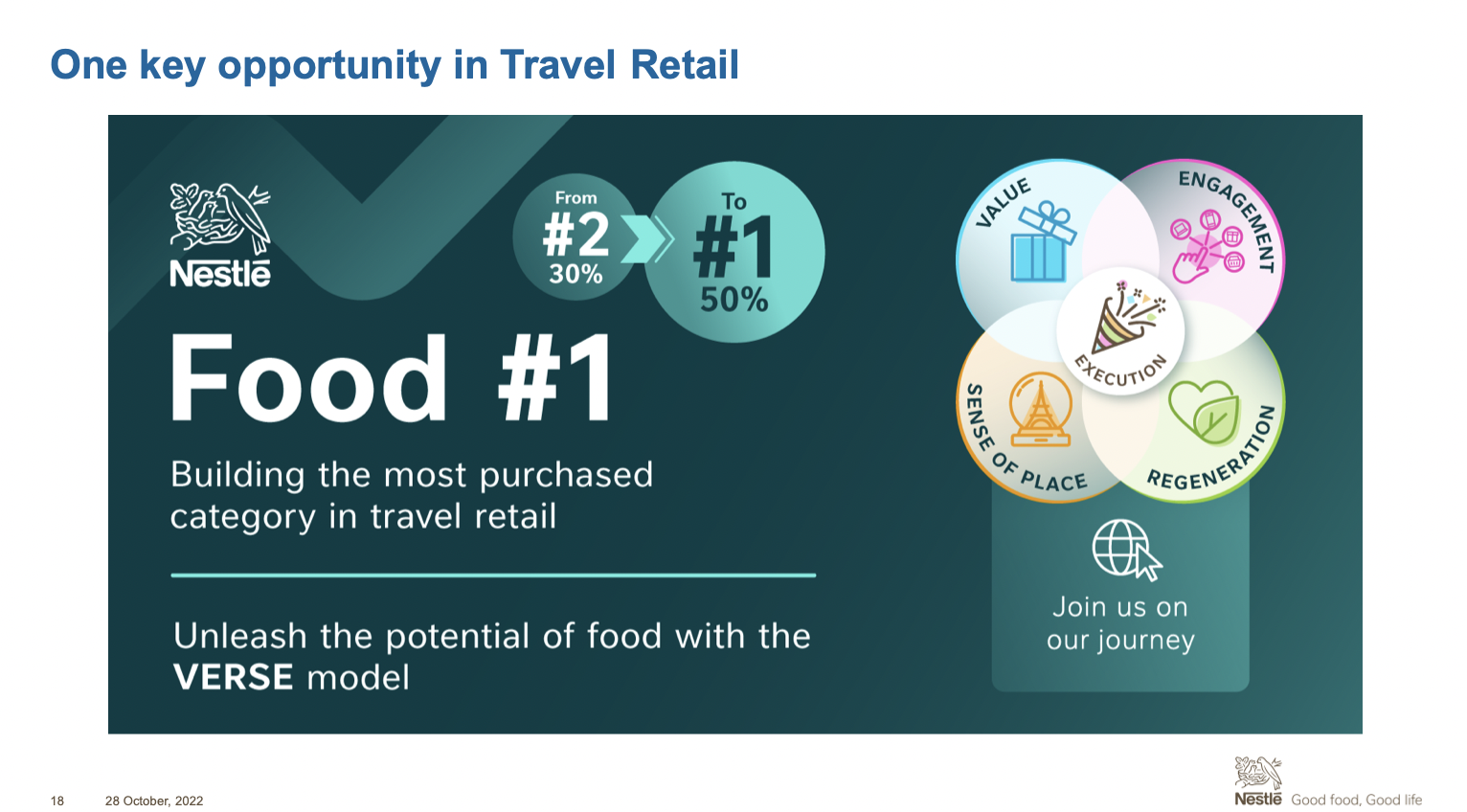
Looking at the opportunities from a Nestlé standpoint, Dryburgh said: “77% of packaged food is confectionery in travel retail. This creates a huge opportunity for us by leveraging the untapped part of the food pie, especially coffee and wellbeing.”
He highlighted coffee and wellbeing as exciting new growth opportunities for NITR, using Nescafé and Nature’s Bounty as prime examples. He also tracked NITR’s pre, during and post-trip customer journey and underlined the confectionery company’s sustainability mission.
“Regeneration from a Nestlé standpoint goes beyond sustainability: we are focused on regeneration to protect, renew and restore. We are committed to responsible sourcing, committed to achieving carbon-neutrality by 2050 and transitioning to 100% sustainable packaging.”
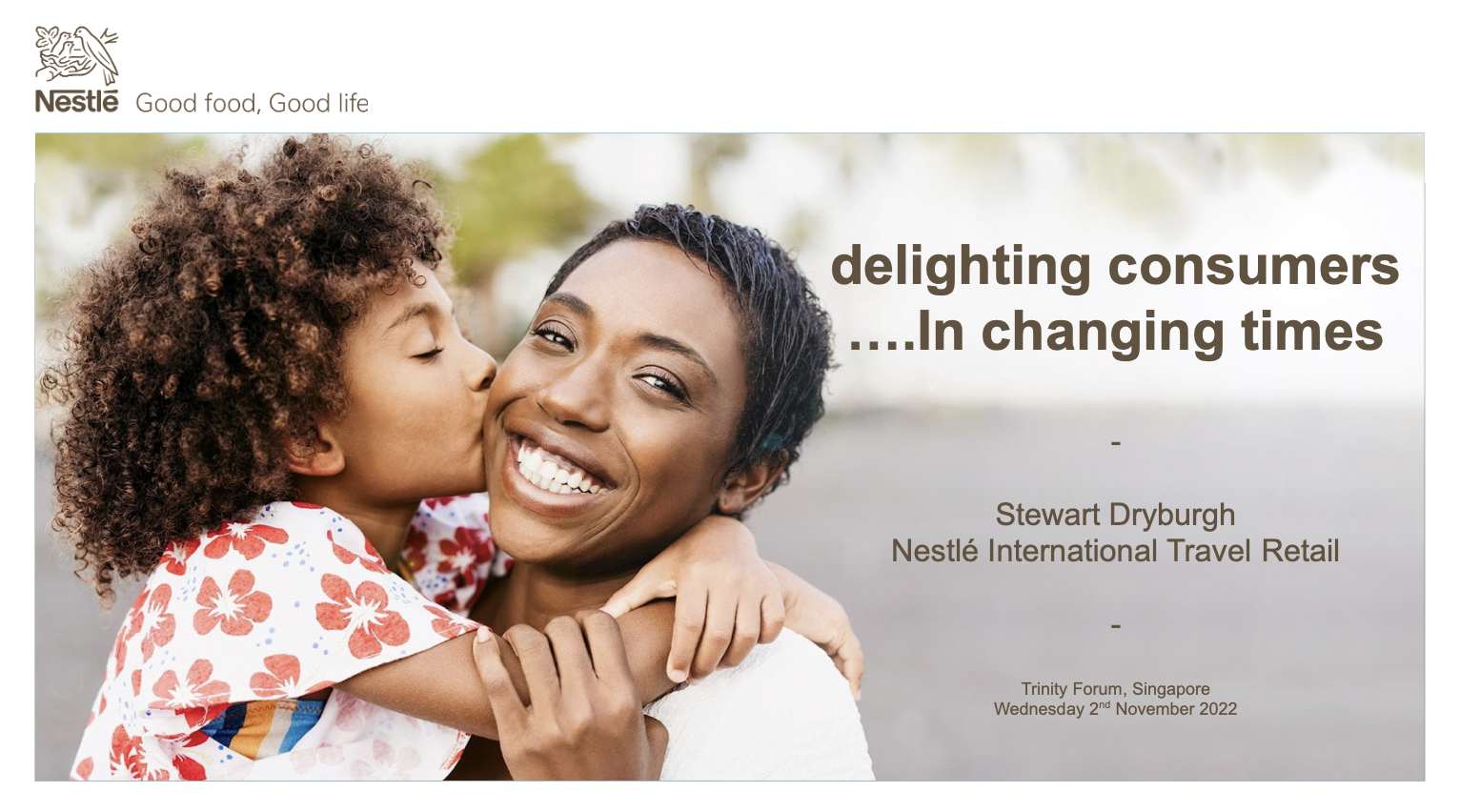
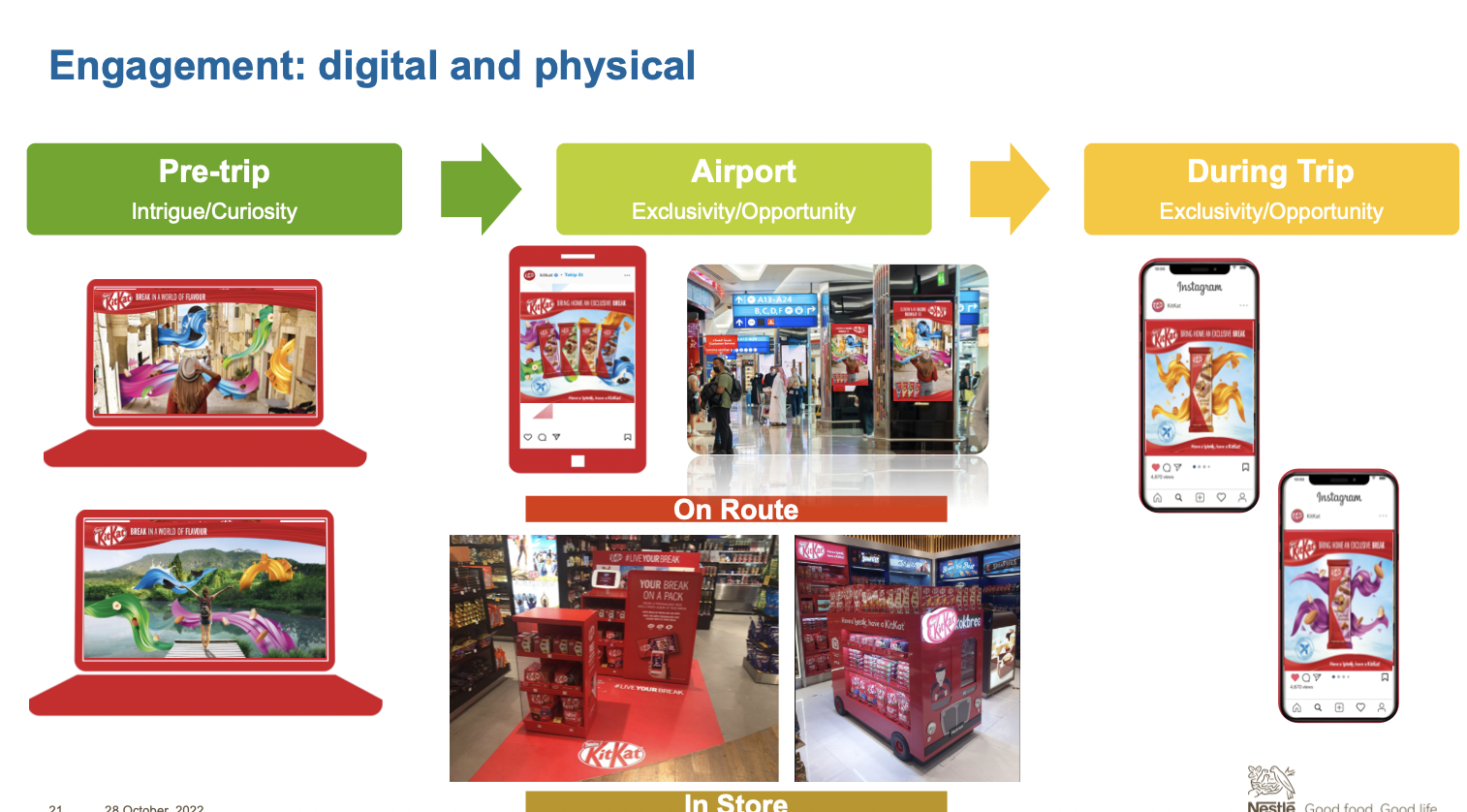
Mohit Lal on winning in wines & spirits
Commenting on what it takes to win in the wines & spirits category, Lal said: “If you want to win in the wines and spirits world, you cannot win without travel retail. We need to look at what the pandemic has changed. Pre-COVID, travel was seen as an indulgence, but we see now that travel is an essential part of life.
On the importance of experience, Lal said: “Travellers are no longer concerned about possessing, they are interested in experiences. In a decade, disposable income will shift towards experience. If you try and give it a longer-term twist, the headwinds will be there but the tailwinds of travel will fuel a momentum that will be difficult to manage from a supply point of view. The challenge with travel retail isn’t demand, it’s about supply.”

Speaking about how travel retail should deal with unexpected headwinds like the COVID-19 pandemic, Lal said: “Let’s treat the unexpected as the new normal. It’s about building agility around the entire business. When you look at travel, it’s global not homogenous. As turbulence happens and travel patterns change, how you address retention and investment with agility is what will make you win.”
L’Oréal, the ‘Unicornasaurus Rex’ of travel retail

L’Oréal is seeking to become the ‘Unicornasaurus Rex’ of travel retail, as it continues to push the boundaries of innovation and sustainability. That is according to L’Oréal Travel Retail President Vincent Boinay, who talked about how the company is adapting to the future of beauty at the Trinity Forum.
A unicorn is a term used to describe a company that has disrupted its sector in a meaningful way.
Talking about L’Oréal Travel Retail’s latest beauty tech projects, Boinay highlighted its salon water-saving solution; Lancôme shade finder tool; Modiface virtual try-on technology and personalisation tools with Maison Martin Margiela.

He also highlighted the YSL Scent Station, an at-home tool that measures users’ emotional reactions to fragrances. Other examples of beauty tech at work included the SkinCeuticals light-powered skin analysis tool and the group’s recent partnership with BreezoMeter weather data application.
He said: “We embrace and seek to disrupt with technology. We love disruption and we encourage it. There is no opposition between old world companies like L’Oréal and unicorns. At L’Oréal Travel Retail, we want to become travel retail’s first ‘Unicornasaurus Rex’, a solid and robust old company as well as a disruptive beauty technology company. Travel retail needs disruption and we are here to push the boundaries.”

9:35 The APTRA Exchange: Navigating the headwinds
The Asia Pacific Travel Retail Association (APTRA) Exchange looked at the challenges and dynamics facing industry recovery, focusing on logistics and supply chain issues, labour shortages, and inflationary pressures on consumer spending power.
The debate was led by The Moodie Davitt Report President and Editorial Director Dermot Davitt, with speakers including Partnerwise Boardroom CEO Salvatore Arico, Pacific Asia Travel Association (PATA) CEO Liz Ortiguera, Diageo Global Travel APAC, MENA and India, Commercial Director Sandra Tassilly and APTRA President and King Power Group (Hong Kong) CEO Sunil Tuli.
Tuli introduced the session, saying: “The pandemic brought us all to our knees ;the world, businesses, economies, lives were shattered. Amongst countless other businesses, retail, hospitality, travel and tourism, travel retail.
“As we began to emerge from the crisis at the beginning of this year, there was excitement everywhere. Things were coming back. Travel was starting again, restrictions were being lifted slowly but surely.
“However, were we ready for it? Are we ready for it now? Staff were let go. So they found other means to survive. Now that things are coming back, there is a massive shortage of manpower, be it at security, baggage handling, immigrations, service staff at retail and F&B outlets.
“Then, just as the world was opening up, a madman goes and starts an unnecessary war. This is not a political forum, so I will not go into that debate, but the results have been catastrophic, thousands of lives have been unnecessarily lost.
“It has affected the rest of the world as well. Stock markets suffered, energy has become scarce and costly, shortages of materials affected supplies.
“Fuel prices have gone up, airline prices are ridiculous now… what is going on? Is it all going to affect our businesses?
“There are no clear answers, and we aren’t going to walk away from this session with a solution. What we hope to achieve is to discuss as an industry, as the Trinity, these issues, to try and understand the problems, and hopefully have some ideas on how to navigate the headwinds.”
The group discussed key tourism markets to watch, inflation and changes in the character of travellers. Ortiguera noted that many more travellers, especially affluent ones, place a premium on conscious travel and sustainability.

Ortiguera said that key markets to watch for growth in 2023 include West Asia, South Asia, Middle East and Polynesia. But she said that the picture is dynamic because of the many changes in border and visa policies.
“We are seeing a travel surge right now but that will calm down. For now rising prices are not a hindrance but based on capacity. We have seen business class fares rise to two to five times more than before the pandemic.”

Ortiguera highlighted new consumer trends, including a focus on experiences and wellness. She also spoke about conscious consumers and conscious communities. “Government nowadays is putting communities at the heart of travel. It is a recognition that people value family more, health more, and there is more consideration about work-life balance.”
On China, she added: “Once China starts opening up it will be fierce, like a dragon that awakens in a different form.”
On supply chain, Sandra Tassilly said that COVID-19 forced the company outside of its comfort zone.
She said: “It forced us to have a growth mindset, in which we became extremely agile and ensure trusted communication with our customers and our retailers.

“We spent a lot of time data-sharing with our retailers and going back to basics. As long as we were all honest and humble that helped us a lot for trusted relationships for the future. Supply chain is now at the centre of everything. I don’t think the supply chain team will go back to being a support function.”
On staffing in general, Arico said there are some trends in how people think about motivations behind their work.

He said: “During the pandemic there was a kind of self reflection and prioritisation among families about what they want in life. The new generation is bringing more flexibility, autonomy, a new form of employment, moving away from the classic, standard relationship between employer and employees towards having more time and flexibility.”
DAY 2 WEDNESDAY, 02 NOVEMBER
9:00 Leveraging the Vietnam opportunity

For the opening session of Day 2, IPPG Vice President and IPP Travel Retail CEO Phillip Nguyen explored the extraordinary Indo-China opportunity by highlighting the future, connectivity and potential of Vietnam. IPPG is making a significant transition from travel retailer to airport operator, Nguyen said.
Vietnam’s GDP growth is expected to bounce back and grow +6.5% annually from 2022 onwards.
With 22 airports set to be expanded by Q4 2030, ten international, 12 domestic and four new airports proposed for 2030, Nguyen highlighted Vietnam’s connectivity as an Asia Pacific hub.
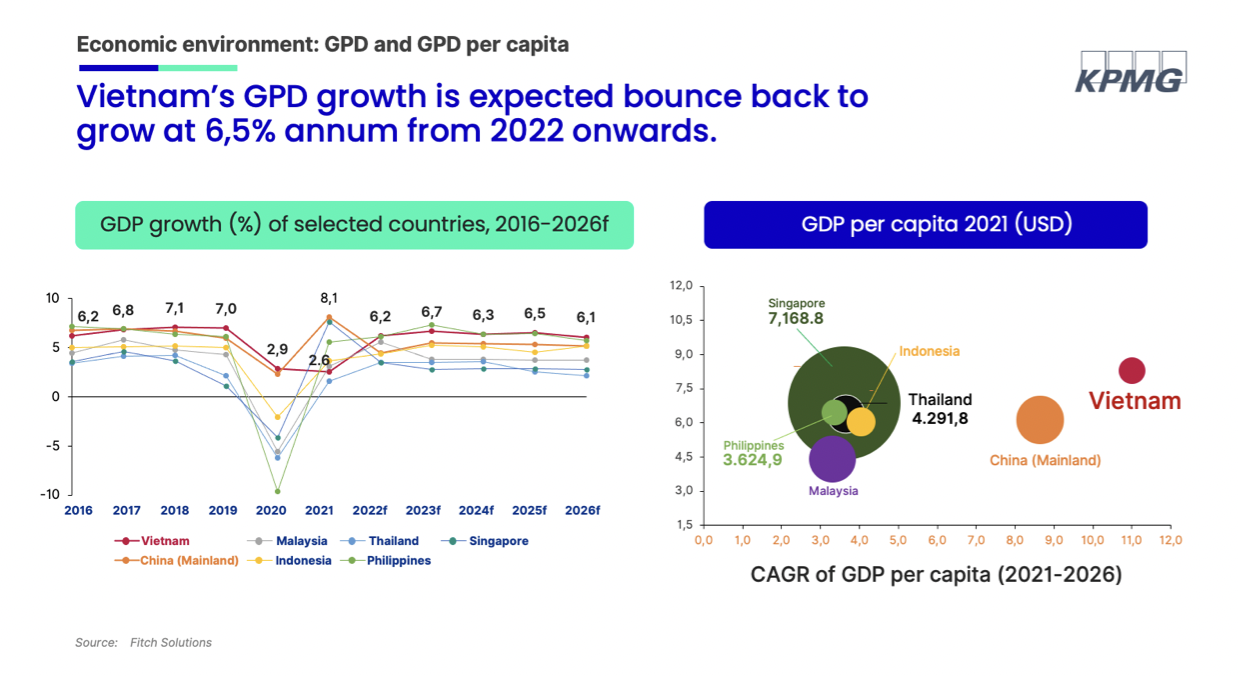
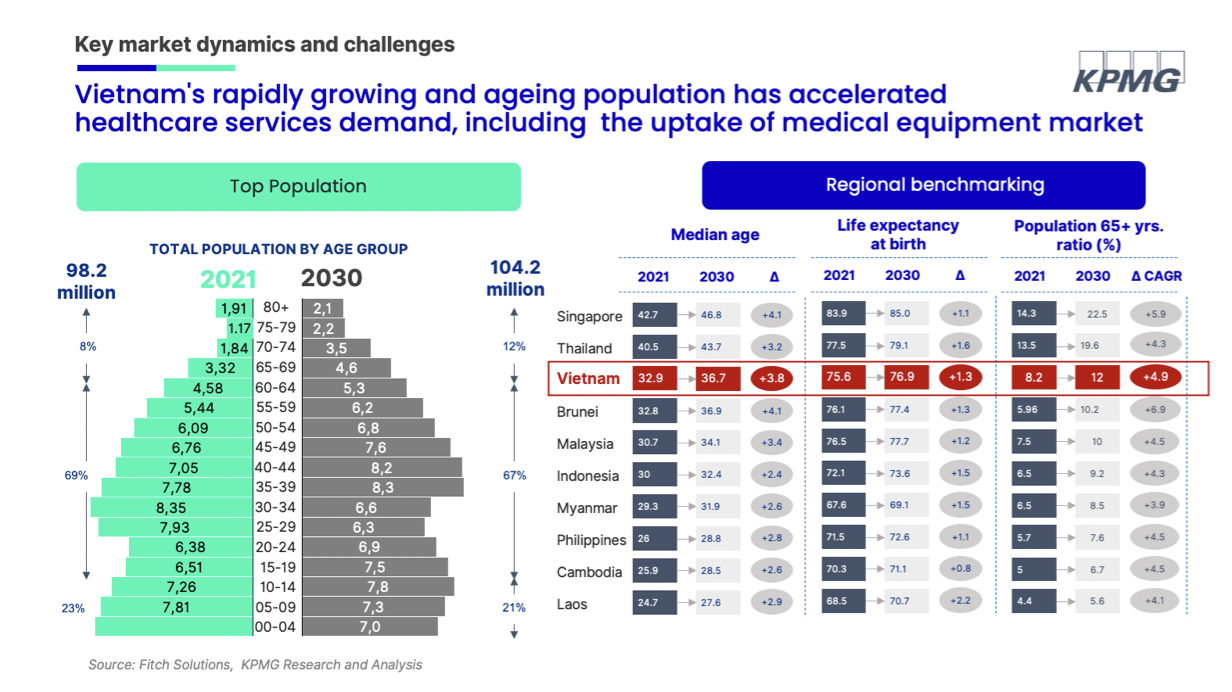
These airport expansions and openings include Da Nang Airport International Terminal, Noi Bai International Airport, Camranh International Terminal, Phu Quoc Airport, Tan Son Nhat International Airport and Longh Thanh International Airport.
In Camranh Airport pre-COVID, the passenger profile was 70% Chinse inbound. Nguyen explained, “We’ve been promoting Vietnam as a destination to change this mix. Our airports are world class and we believe the future for this destination is entertainment and lifestyle. Tan Son Nhat International Airport construction is ongoing. By 2025 it will transition to Longh Thanh International Airport, a new airport in the Southern hub. We believe this will be a focal point in driving Vietnam’s economy and become a key player in the Asia Pacific region. We invite you to explore Vietnam’s potential and make it your second home.”

On the potential for Vietnam to become a duty free haven in Southeast Asia, Nguyen said: “I believe in Vietnam as an economic corridor in Asia Pacific. Phu Quoc is a visa-free island and has plenty of potential. We understand that to achieve this we need to invest in Terminal 2 to grow that sphere.
“In terms of that Hainan ideology, we’re targeting the 100 million Vietnamese to invest in the idea of a tax-free/duty free destination. Vietnam has that opportunity, it’s ongoing and now it’s all about policy change. Phu Quoc island is just one of many opportunities in Vietnam.”
TUESDAY 1 NOVEMBER
Watch the YouTube video above to see highlights from Day 1 of the Trinity Forum 2022
22:00 Welcome Cocktail
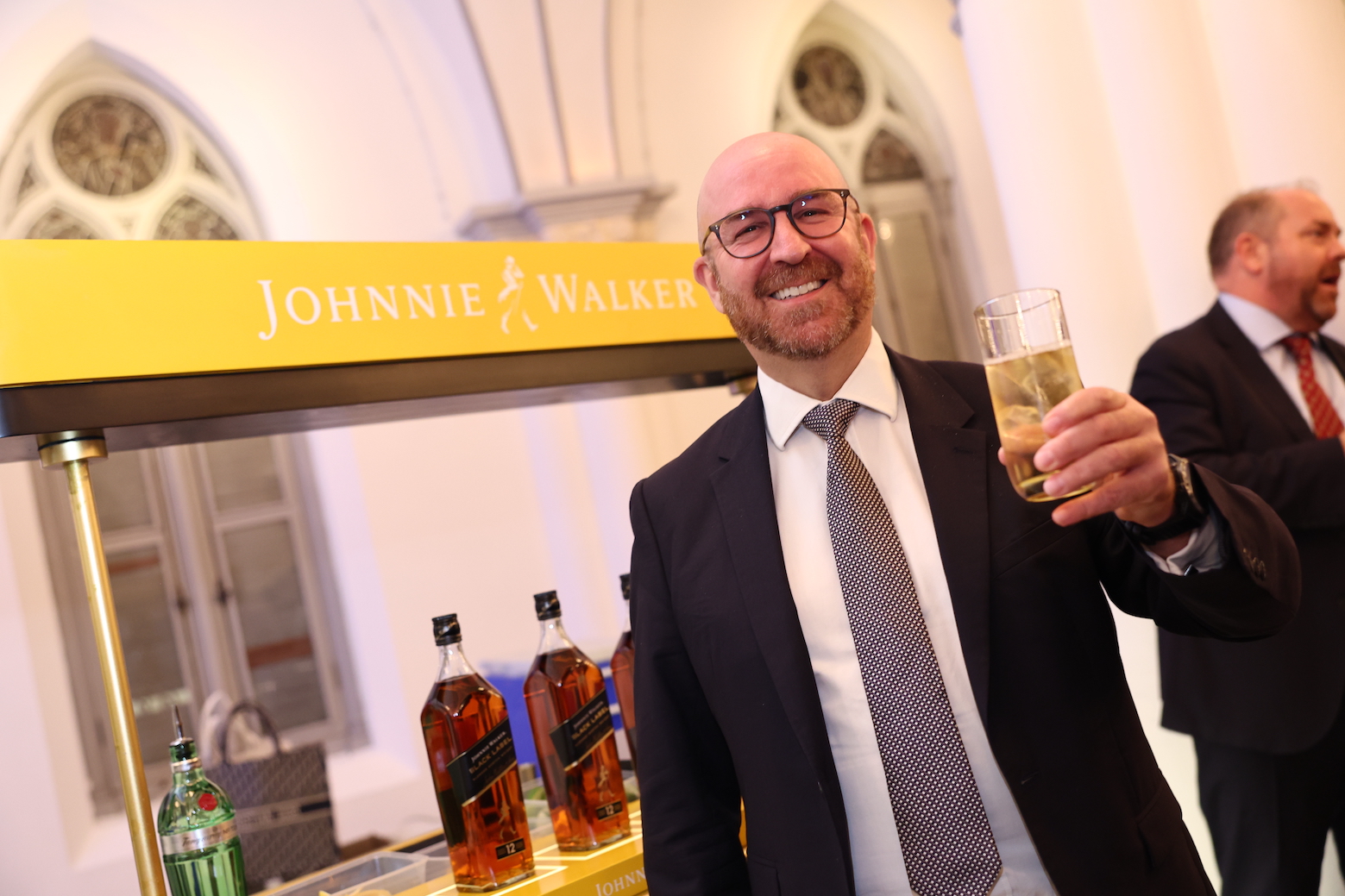
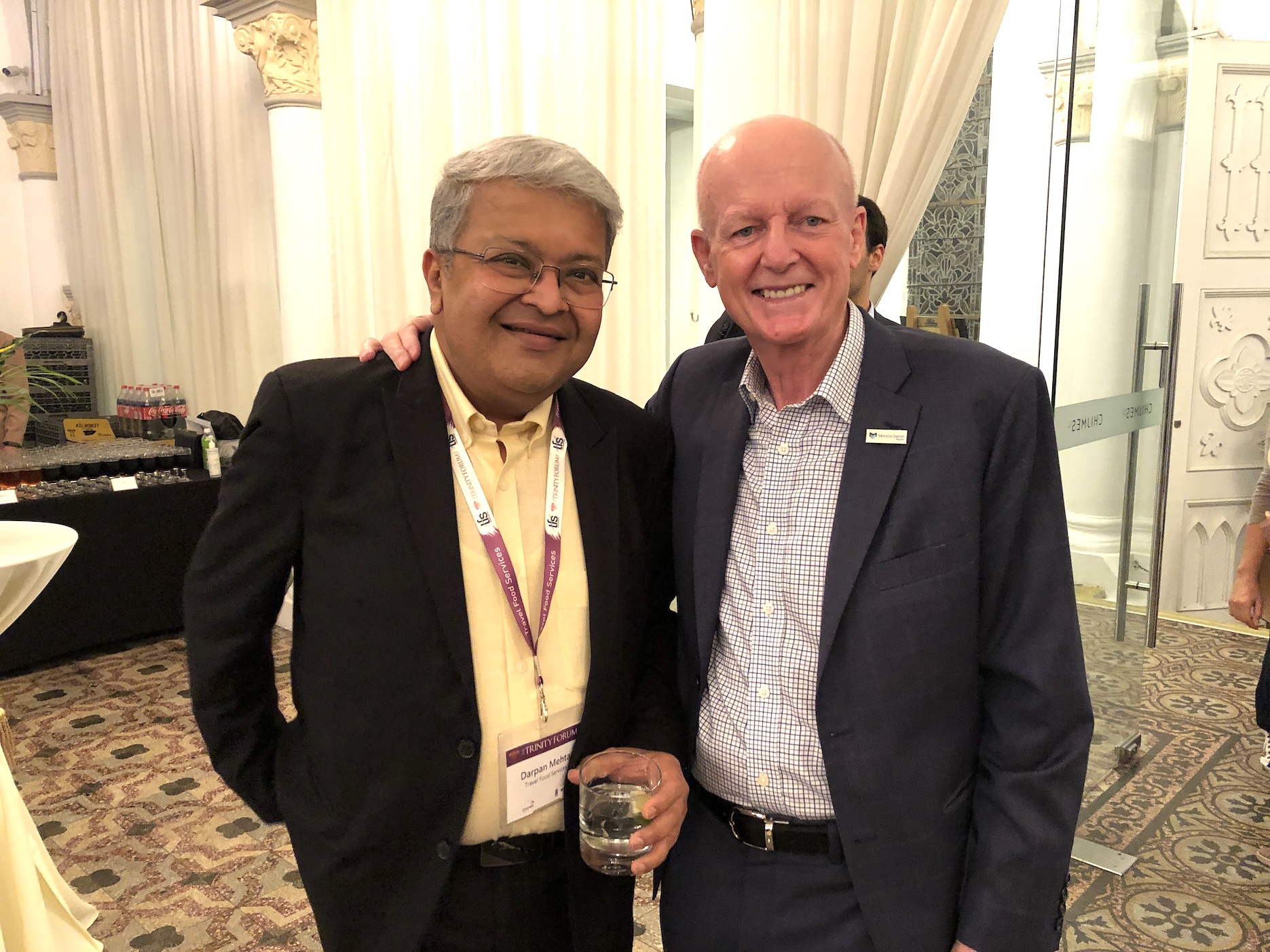






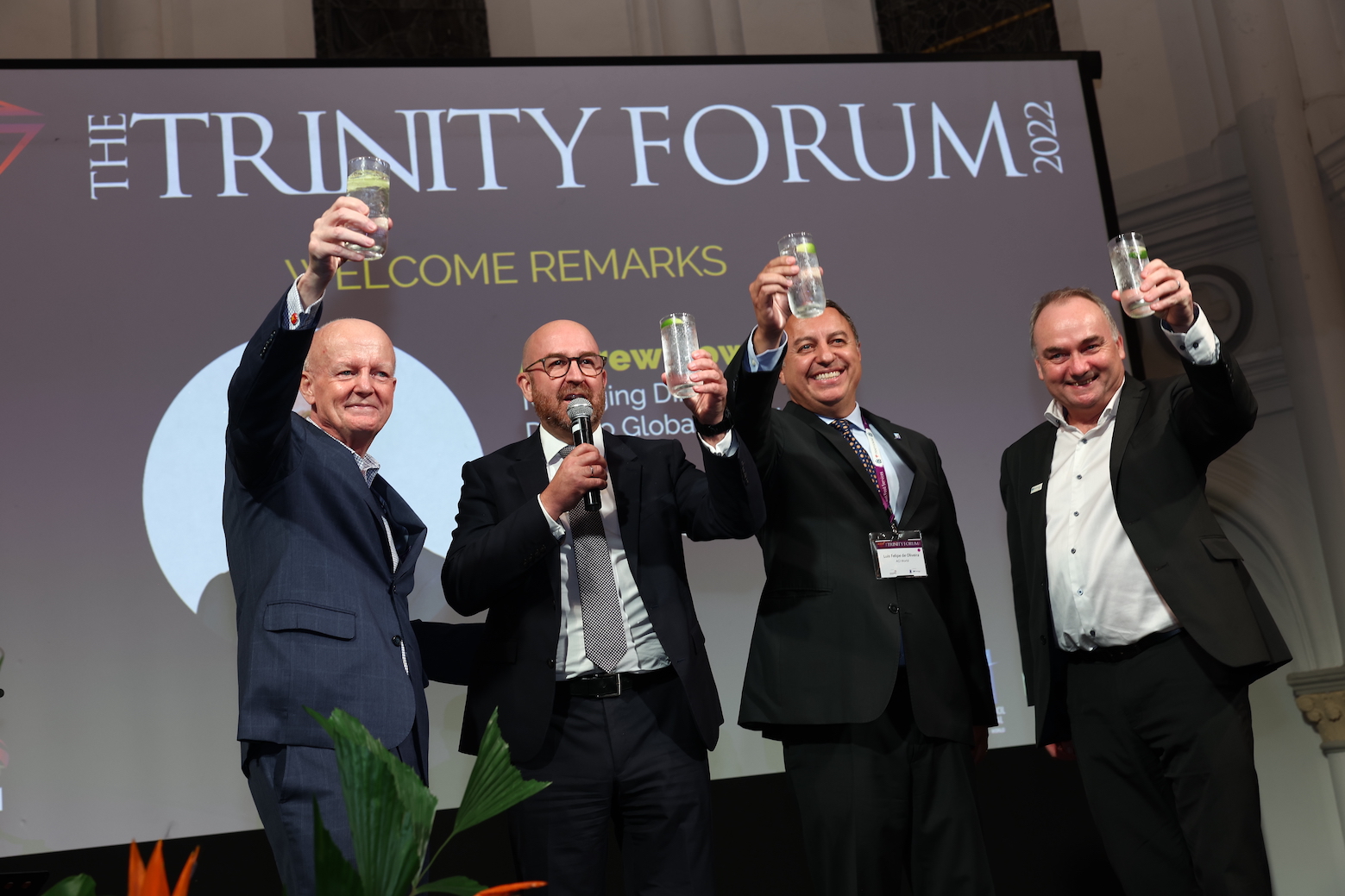

The Trinity Challenge winner revealed
The Trinity Challenge, sponsored by Mondelez World Travel Retail, is a pan-industry project designed to encourage and reward imaginative solutions take the industry forward. To round off a memorable first day at Trinity, four finalists pitched their business ideas to three expert judges and the audience with the results announced on the spot.
Mondelez World Travel Retail Managing Director Jaya Singh opened the session by looking back at how the industry has changed since the first Trinity Challenge in 2019. He said: “We’re in an industry that is reinventing itself. A thing of beauty is being reborn in our industry post-COVID and we should be excited by that.
“Three years ago I had the pleasure of hosting the first Trinity Challenge. It was about leadership, innovation and value creation. It’s about getting more shoppers to stores, making them spend more and at a greater frequency.”


The Trinity Challenge 2022 finalists included GrayMatter Software Services Pvt Ltd (represented by Vice President Presales & Business Solution Viren Gupta), Dayholi (represented by Founder Fjolla Holzleithner), Spark Group of Companies (represented by Founder & President Heidi Van Roon) and Plaza Premium Group (represented by Global Business Development Director Jonathan Song).
The judges for the Trinity Challenge were Mondelez World Travel Retail Managing Director Jaya Singh, Changi Airport Group Group Senior Vice President (Enterprise Digital Ecosystem & Business) Hung Jean and Greater Toronto Airport Authority Associate Director, Strategic Partnerships & Digital Business Tina Williams.

The winner of the Trinity Challenge 2022 was virtual reality company Dayholi. Within the five-minute time limit, Founder Fjolla Holzleithner demonstrated how the company’s VR glasses and ‘consumer dome’ can transport users to any travel destination in the world. She also outlined how it can be applied to the airport environment.
She said: “Dayholi was founded with the goal of enabling everyone in the world to travel without any limits. No limits on time, money, health and sustainability. Dayholi beams people into new realities through immersive 8K quality virtual experiences that tap into all the senses.
“We increase revenues by creating ‘Day Passengers’. These passengers buy tickets and go to the airport but they don’t fly. They go through the whole process, go into the VR dome and travel all over the world (virtually). After the experience, we can partner with the F&B concessions and travel retail brands to tie in their offer with the Dayholi experience.
“With our technology, we can enhance brand experiences through virtual reality technology, increase retail loyalty and maximise entertainment at lounges and gates. We think Dayholi can also enhance staff training by giving them an enjoyable and interactive experience.”

16:30 Trinity Panel: Stronger Together
Key figures from across the airport, airline, brand and retailer sectors shared lessons from the pandemic and spoke about how the industry can become stronger through deeper collaboration.
Hosted by The Moodie Davitt Report President and Editorial Director Dermot Davitt, speakers agreed that the key to revival is an enhanced approach to alignment with fellow industry stakeholders – a principle at the heart of the Trinity concept – and a common ethos to do so innovatively and sustainably.
Four speakers took part: ACI Asia-Pacific Director General Stefano Baronci, Diageo Global Travel Managing Director Andrew Cowan, IATA Airports & External Relations Asia Pacific Regional Director Vinoop Goel and Lagardère Travel Retail Chief Operating Officer for Asia and member of the Global Executive Committee, Séverine Lanthier.

Andrew Cowan highlighted the Diageo view that sales in the spirits category in travel retail can double in size in the decade ahead, if all partners in the travel chain work more closely together.
He introduced an updated category strategy designed to work only in collaboration with partners and with consumer experience at its heart.
Key pillars include planning for and introducing balanced choices, promoting further exploration and discovery, making the moment (with drinks choices to suit all occasions and lifestyles) and celebration (gifting for oneself and others).
Related to all of these is the underlying demand among consumers that travel retail shows itself to be a more sustainable industry.
Stefano Baronci outlined the trajectory of recovery in the Asia Pacific travel market, noting that it is home to many still restricted national markets, with traffic in the region in 2022 down -45% compared to 2019, well behind other major regions.
However, on the positive side, the opportunity remains strong. Asia Pacific was home to nine of the top ten domestic market routes worldwide in October 2022.
Seizing on the positives, Baronci added that we are “going back to the future”. In 2011, Asia Pacific surpassed North America and Europe as the world’s largest air transport market and remained in that status until 2021. That opportunity can be revisited with the recovery now under way, he said, with Asia Pacific currently at 2012 traffic levels. And that growth can be accelerated as long as the industry embraces the need to reconnect, improve and diversify.
Vinoop Goel said that the future of the industry is bright but lessons need to be learned from the pandemic, including further digitalising the journey and removing processes that eat into dwell time at the airport.
Goel said: “73% of passengers are willing to share their biometric data to improve airport processes. We need to work together to come up with more digitalised travel through biometric-enabled identification.
“Paper to digital transformation is key. It will need regulatory support and airlines, airports and agencies need to work together for global implementation.”

Séverine Lanthier had an upbeat message for the industry after the pandemic. She said: “I remember someone saying to me before that travel retail is dead. But today we can say it is definitely not dead. We are the proof. We are still facing uncertainties but I do believe we can be stronger together.
“As tenants we rely on airports. We need to move together in the same direction and collaborate, creating more balanced partnerships. We are now moving towards a profit-sharing model. The airport is our partner. We are not the tenant anymore. Together we are working closer to deliver a better service to the customer.”

16:00 KitKat Coffee Break


15:30 Leader’s Perspectives
Guests had the opportunity to watch an exclusive video interview with Dufry CEO Xavier Rossinyol and The Moodie Davitt Report Founder & Chairman Martin Moodie during The Trinity Forum.
Rossinyol spoke about Dufry’s ambitions to create an integrated, consumer-centric global ‘Travel Experience’ player following its planned merger with airport food & beverage sector leader Autogrill.
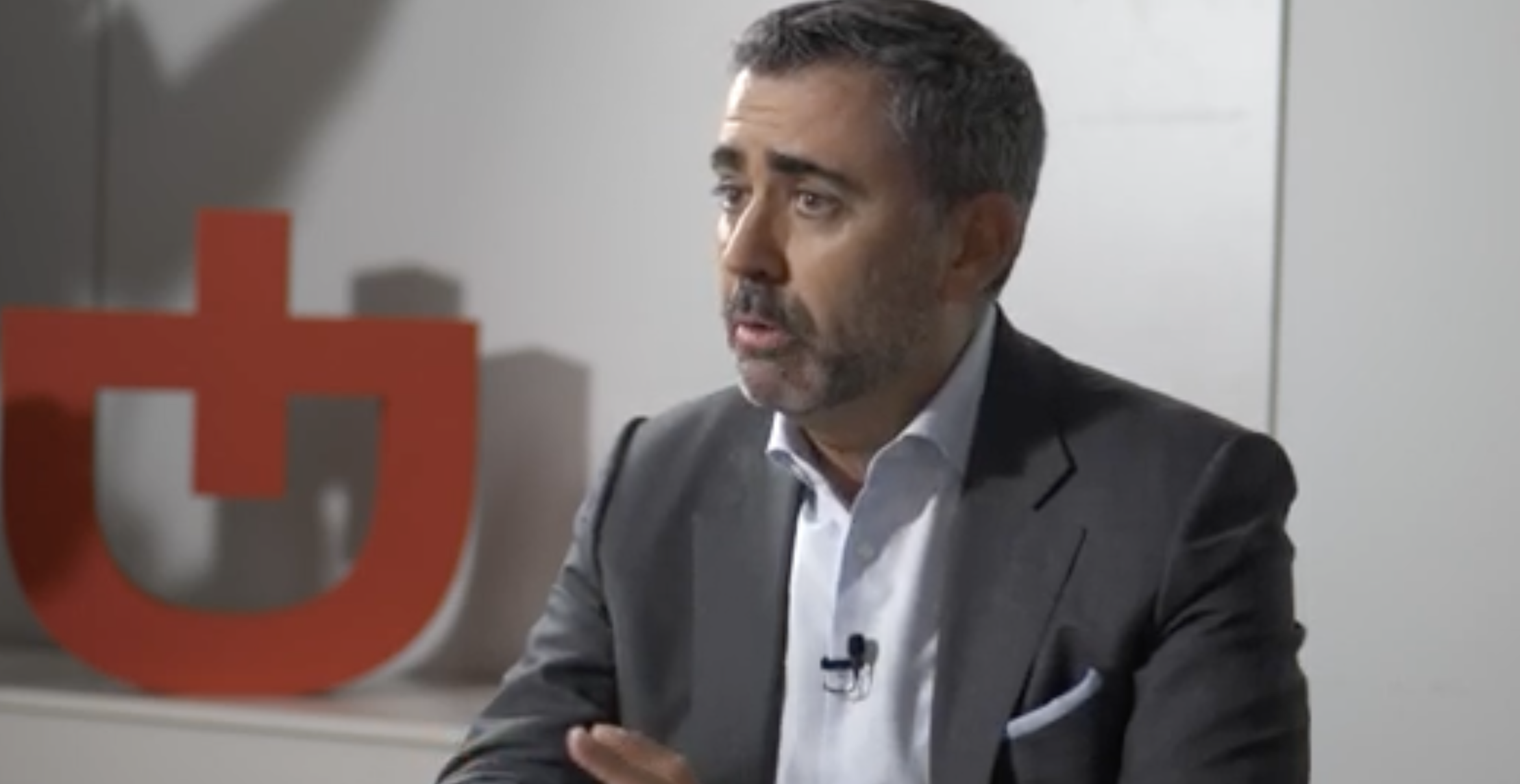
He said: “If everything goes as planned the closing should happen in Q1 2023. I’m very excited about this combination of Dufry and Autogrill. I’m very happy that the Dufry Board of Directors approved the transaction and Edizione and the Benetton family approved the deal and are happy to support the new Dufry going forward, as one of the most important shareholders.
“The combination will allow us to address all the needs and desires of the traveller from an end to end experience. We have today duty free stores, branded stores, convenience stores and now we will have F&B. We need to remember one of the limitations in our industry is the dwell time, so making a smart combination of the different parts of the offering will be a revolution.”
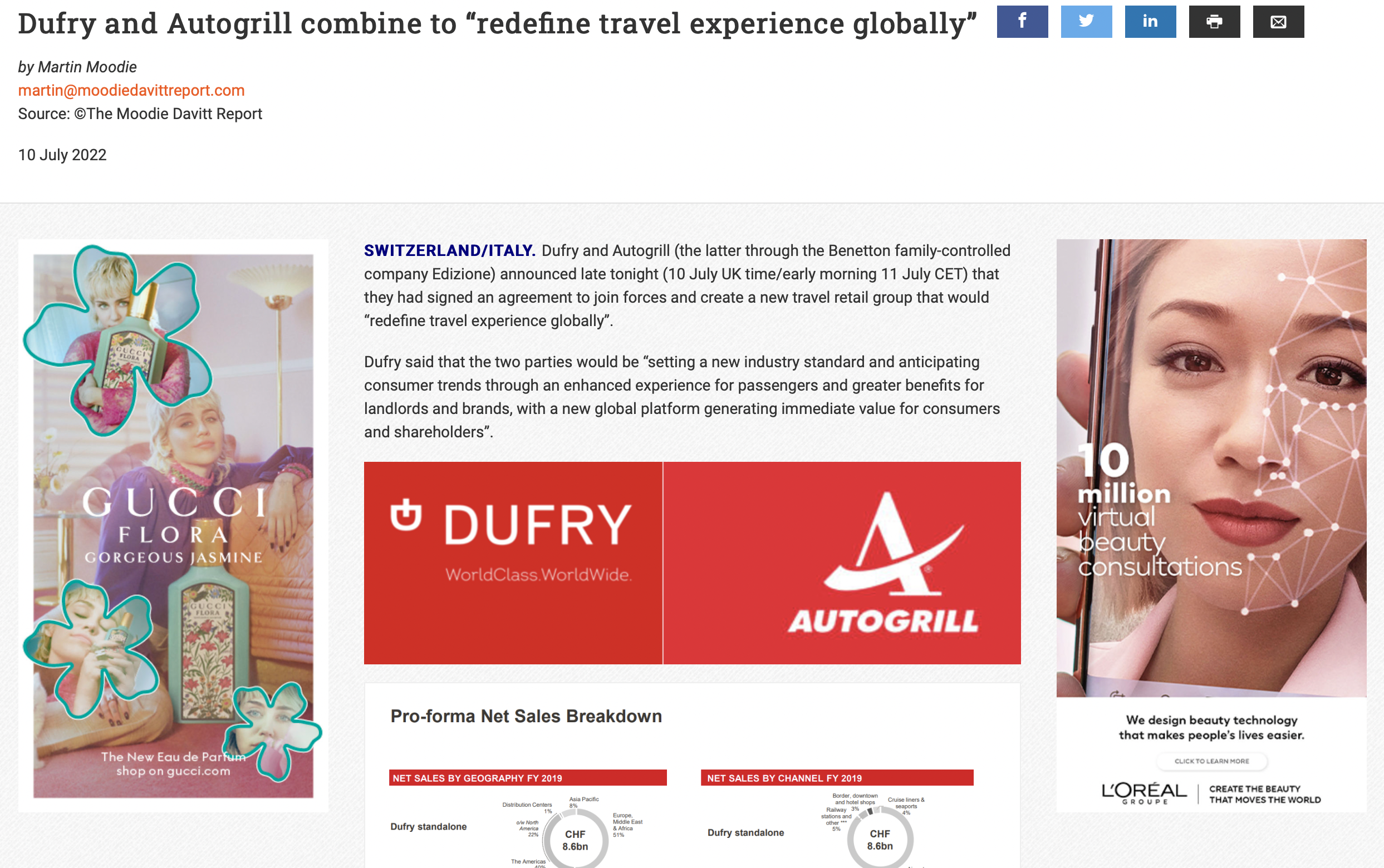

15:00 Charles Chen discusses the exciting future of CDFG 
While the journey from China to Singapore may have been difficult, China Duty Free Group (CDFG) President Charles Chen expressed his excitement to be back at The Trinity Forum after three years.
Chen said that the international travel restrictions in China through the pandemic had offered an opportunity for CDFG to adapt its approach. “China is changing,” he said. “The outbound tourist flow at China’s airports and border ports dropped sharply, but Chinese tourists began to travel within the country. This inspired me to adapt and change our approach too.”

Hainan, buoyed by its offshore duty free sector, has become the preferred destination for domestic tourists with Sanya ranked first in the Travel Destination Wish Index. “The once rising consumption of fashion products, watches and other accessories decreased, while sales of fragrance, skincare and alcohol soared. In the past three years, everything went online,” Chen said.
Commenting on the three key judgements that have influenced CDFG’s COVID-19 response, Chen said: “We believed the duration and impact of COVID-19 may greatly exceed SARS in 2003, so a long-term approach was needed. Benefitting from 40 years of China’s opening up, Chinese consumers will still be able to afford a lot of things. Finally, brands will stand with us hand-in-hand to tide over the difficulties.”

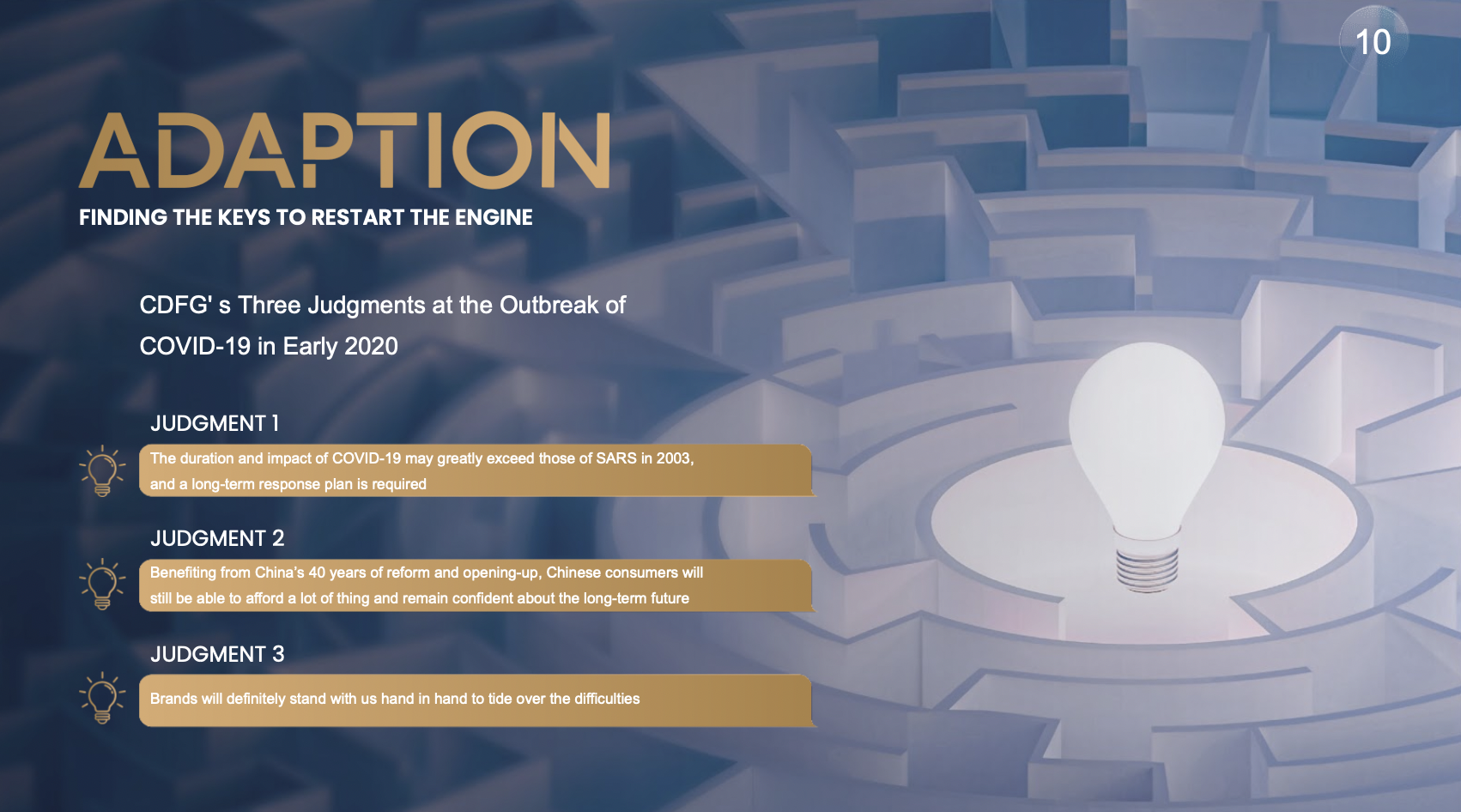
These judgements led CDFG to lean on big data, innovation and cooperation to to thrive amid the pandemic. Chen highlighted the CDF Member WeChat Mini program as one of its big successes over recent years. The program has become the most popular platform in China travel retail.
One of the key features is CDF Member Buy, which has accumulated over 300,000 daily active users, serving over 20+ million members and connecting the CDFG offline to online shopping experience.

Chen thanked CDFG’s brand partners who have helped drive its success. With an eye towards the future, he shared the five new pillars for CDFG’s future development. These are to improve new retail business, build more downtown duty free stores in China, bid for large airport hubs in domestic and international markets, expand overseas business and strengthen capital operation.
“We can never go back to three years ago. We cannot stop moving forward. We have to embrace the future bravely with wisdom and courage,” Chen said.


Chen concluded a dazzling presentation on the newly-opened cdf Haikou International Duty Free Shopping Complex. As reported, the cdf Haikou International Duty Free Shopping Complex features over 800 renowned international and local brands, including a host of debut and exclusive duty free concepts, brands and boutiques in China. In doing so, CDFG has created a world-class leisure and shopping complex.

13: 50 Leaders’ Perspectives
Three leading executives in our industry representing airports, brands and retailers featured in a powerful opening session of the Trinity Forum 2022. The Moodie Davitt Report Chairman Martin Moodie moderated three successive conversations about how to grow the business and deliver an enhanced consumer proposition underpinned by the right values of innovation, sustainability, digitalisation, diversity and inclusion.
Dubai Airports CEO Paul Griffiths talked about curating the ultimate airport experience. Offering the brand perspective, Global SK-II CEO Sue Kyung Lee discussed her vision and values for the future in an evolving consumer and travel retail landscape. Finally, China Duty Free Group President Charles Chen charted CDFG’s keys to success over recent years and how he sees the group evolving.

Griffiths implored the travel retail industry to fundamentally change its approach to partnership. He said, “We’re not really a Trinity, we’re all part of the same ecosystem and have the same customer. We have to change the way we think. One fundamental thing we did at DXB was not to accept the transfer of pain to anyone. We met and discussed ways of getting through this crisis together. We worked together to eliminate that pain. As a result of that, non-aeronautical revenue became 70% of our income during the pandemic.”
While 3.9 billion people were in some form of lockdown, DXB managed to bounce back. “We have to work very closely. It’s time for us to rethink fundamentally what our industry is all about. We have to rethink our infrastructure and adapt to the digital challenges we have today,” he added.
“We have to spend the maximum amount of time interfacing with customers. The airport is now one of the few places where customers can see, touch and feel products. We have to change the way customers spend their time at the airport.”

Offering the brand perspective on how the industry needs to transform to meet evolved consumer demands, Lee said: “We need to be obsessed with the consumer. This is the single most important thing for a brand. Gen-Z and millennials spend 24/7 on digital, which gives us an opportunity to observe their behaviours and know what they are looking for.
“The second most important thing is meaningful innovation,” Lee added. “Skincare is a very fragmented industry and there’s so much innovation in the category. However, not many innovations stick in consumer memory. Truly meaningful innovations answer consumer pain points and deliver craftsmanship and quality.”

On partnership, Lee said: “The third most important thing is partnership. I like to view the Trinity as a ‘Golden Trinity’. This is a partnership that combines online and offline, physical and digital and is centred around the consumer.”
According to Lee, the biggest challenge faced by the industry is change. “The pandemic has been the biggest change that has impacted the industry. However, change also leads to opportunity. If we embrace change with pro-agility (proactiveness and agility) by accepting change as a part of life then we can react in an agile and effective way.”
13:00 Welcome to the Trinity Forum 2022
Delegates pour into the J.W. Marriott conference hall as the Trinity Forum 2022 officially kicks off
The event, co-organised by The Moodie Davitt Report, Airports Council International (ACI) and ACI Asia-Pacific also heard opening speeches from ACI Asia-Pacific Director General Stefano Baronci and ACI World Director General Luis Felipe de Oliveira.
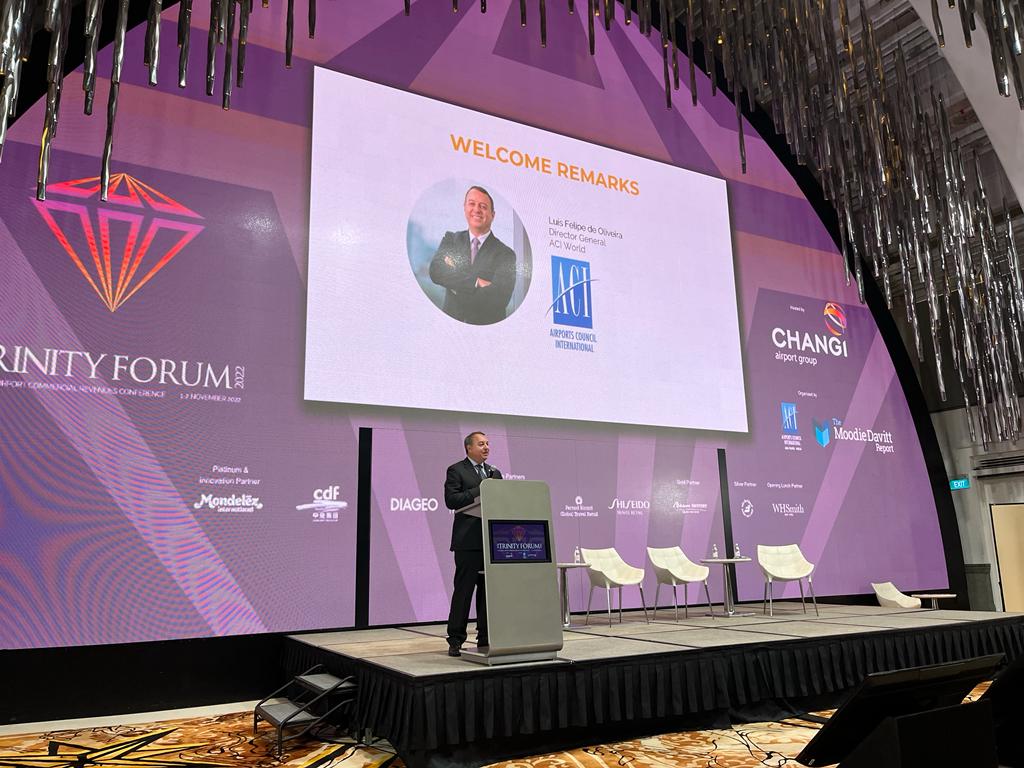

He said: “One thing we have learnt from the pandemic is nobody is better off alone.”
Changi Airport Group officially welcomed delegates to The Trinity Forum 2022 two day conference at the Grand Ballroom of the JW Marriott Hotel Singapore South Beach in Singapore today.

Changi Airport Group Executive Vice President Commercial Lim Peck Hoon applauded the collaborative spirit of the Trinity ‘as everyone stepped up and worked together as a team to overcome the (pandemic) challenges’.
She said: “Today, key markets in Europe, the US and the Middle East have rebounded strongly as they reopened their borders earlier. Our region is also seeing strong signs of recovery, as most countries open up including Japan and South Korea.
“Here at Changi Airport, the number of flights, and passenger volumes have also seen good recovery, to around two-thirds of pre-covid levels. Our spend per passenger, excluding Chinese, has also recovered to around pre-covid levels with some going above. We have reopened all four of our terminals to welcome back our passengers and also resumed our planning for our Terminal 5.”
The event, co-organised by The Moodie Davitt Report, Airports Council International (ACI) and ACI Asia-Pacific also heard opening speeches from The Moodie Davitt Report Founder and Chairman Martin Moodie, The Moodie Davitt Report President & Editorial Director, Dermot Davitt.

The Moodie Davitt Report Founder and Chairman Martin Moodie and The Moodie Davitt Report President & Editorial Director Dermot Davitt welcomed delegates to The Trinity Forum 2022.

Moodie said it was the first time since October 2019 that The Trinity Forum, founded in 2003, has returned to an in-person format.
He said: “To me, this Trinity feels like a seminal event, almost like the first one way back in 2003. A Trinity when we banish the blues, where we look forward to how we can reshape the sector in a fundamentally reshaped world.
“Not just to revive the business but to evolve it, to take it to new heights, in a progressive, profitable manner underpinned by sound and vital principles of our age, of sustainability, of innovation – digital and otherwise – and, of course, the principle that lies at the very heart of the Trinity concept – partnership. Real partnership. Real mutual understanding. Real shared imagination of what our industry can and will be.”
Davitt thanked attendees for their continued support, host Changi Airport Group, and partners at ACI and ACI Asia-Pacific.
He added: “Your attendance, your support, speaks volumes for the value we all place – and perhaps now place even more – on human interaction. So we say the most heartfelt of thank yous to firstly our host, Changi Airport Group, who believed in and wanted this event even during a period several months ago when planning for such an occasion was fiendishly complex.

“We say the warmest of thank yous to our sponsors. It can sound formulaic to say an event would not be possible without them but indeed Trinity 2022 would not have happened without the belief and commitment of those companies that have supported us so graciously.
“We thank our good partners at ACI and ACI Asia-Pacific who do such a stellar job in representing and advancing the interests of their members and who have been such great and warm partners of ours for many years now.
“We’re proud of what we have created with The Trinity Forum. Its flame, one based on the warmth and spark of partnership and of challenging the status quo, may have been dimmed during the crisis but it never once went out.”
Moodie concluded: “Ladies and Gentlemen, our industry is a beautiful melting pot of woman and mankind, a cross-roads of humanity, a thrillingly diverse Sixth Continent as my friend Vincent [Boinay] at L’Oréal Travel Retail so adeptly puts it.
“It knows no cultural, religious, ethnic or gender divides. Travel is a celebration of the human search for discovery and learning. And travel retail should reflect amplify that. Let’s take the opportunity of this, The Trinity Forum reborn, to take our industry to a better and higher level. My goodness, it is good to be back.”





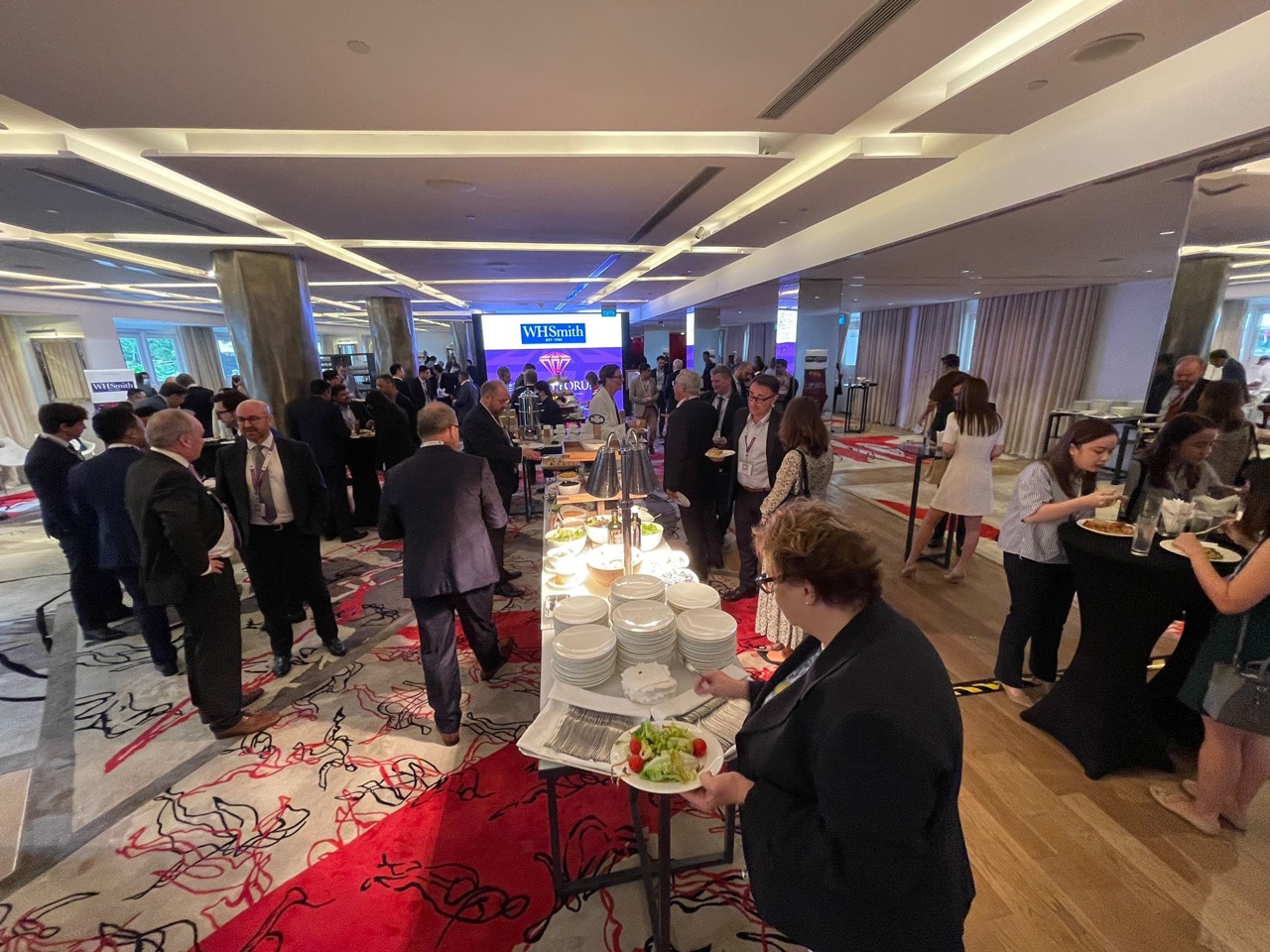
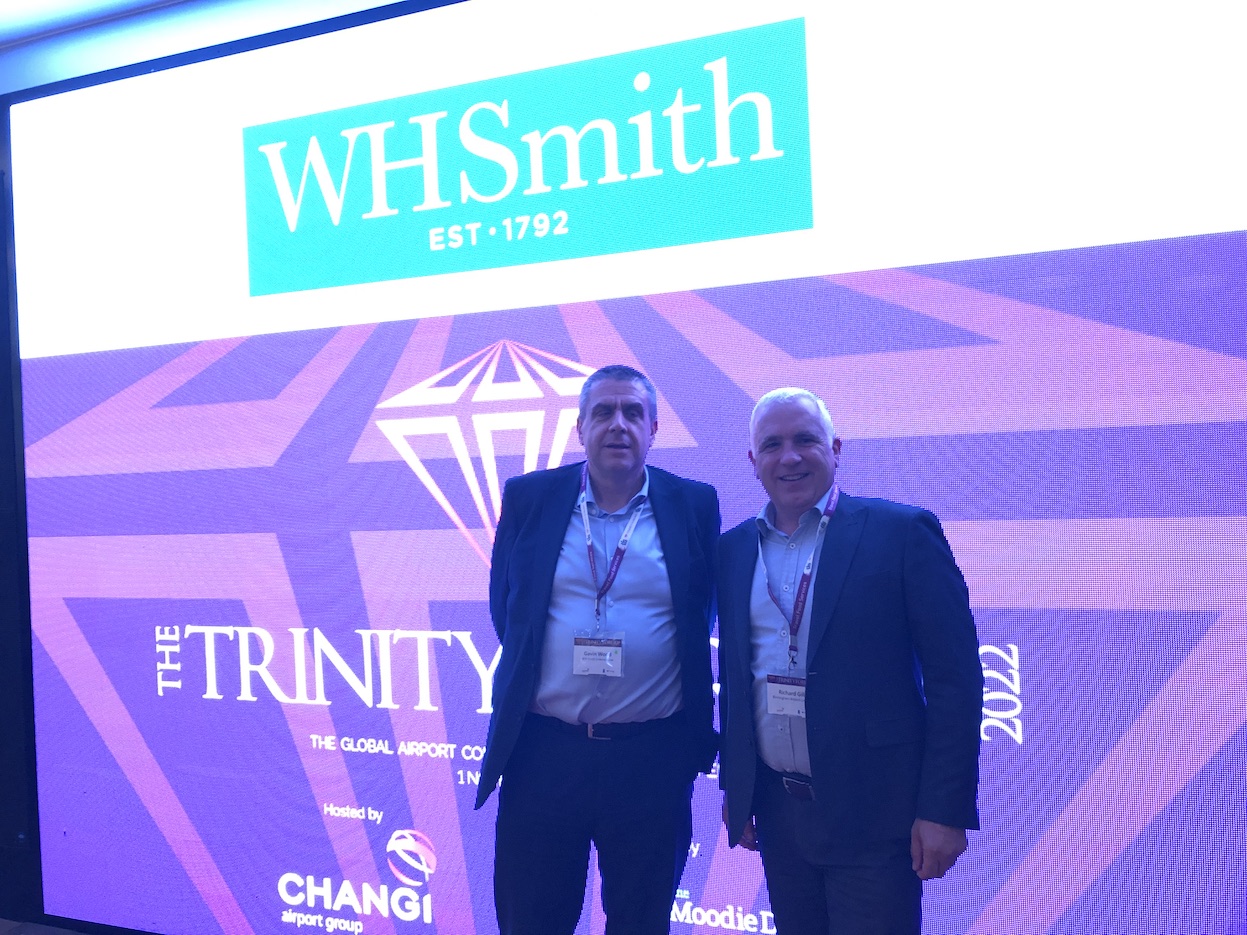


Airports Council International (ACI) held a pre-conference workshop on Day 1 of The Trinity Forum 2022, exploring how industry stakeholders can better leverage the relationship between customer experience, commercial revenues and gain better insights into new airport technologies.
The event featured Paccaya Managing Partner Andrew Ford; ACI World Manager Customer Experience Accreditation Krystyna Pokholchu; and ACI World Programmes and Commercial Services, Senior Vice President Antoine Rostworowski.

Pokholchuk spoke about the importance of customer experience management and how it evolves around managing emotions. She explained that 58% of consumers have ended their relationship with a company after poor customer experience.

ACI World Programmes and Commercial Services, Senior Vice President Antoine Rostworowski touched upon the “double-edged sword of technological disruption’ and said “the key point is to leverage digital transformation to facilitate efficiency”.
He said: “A lot of technology exists today but it seems difficult to deploy it. Some main themes evolving around technological changes include: enhanced self service options, being able to provide more touchless and automated processes, biometrics and passenger baggage. Others are a personalisation of services and let the passenger ‘be in command’.
“More things are taking place but not as quickly as they should be, i.e. virtualisation and AI (artificial intelligence). There is so much data but we need to be more proactive.”



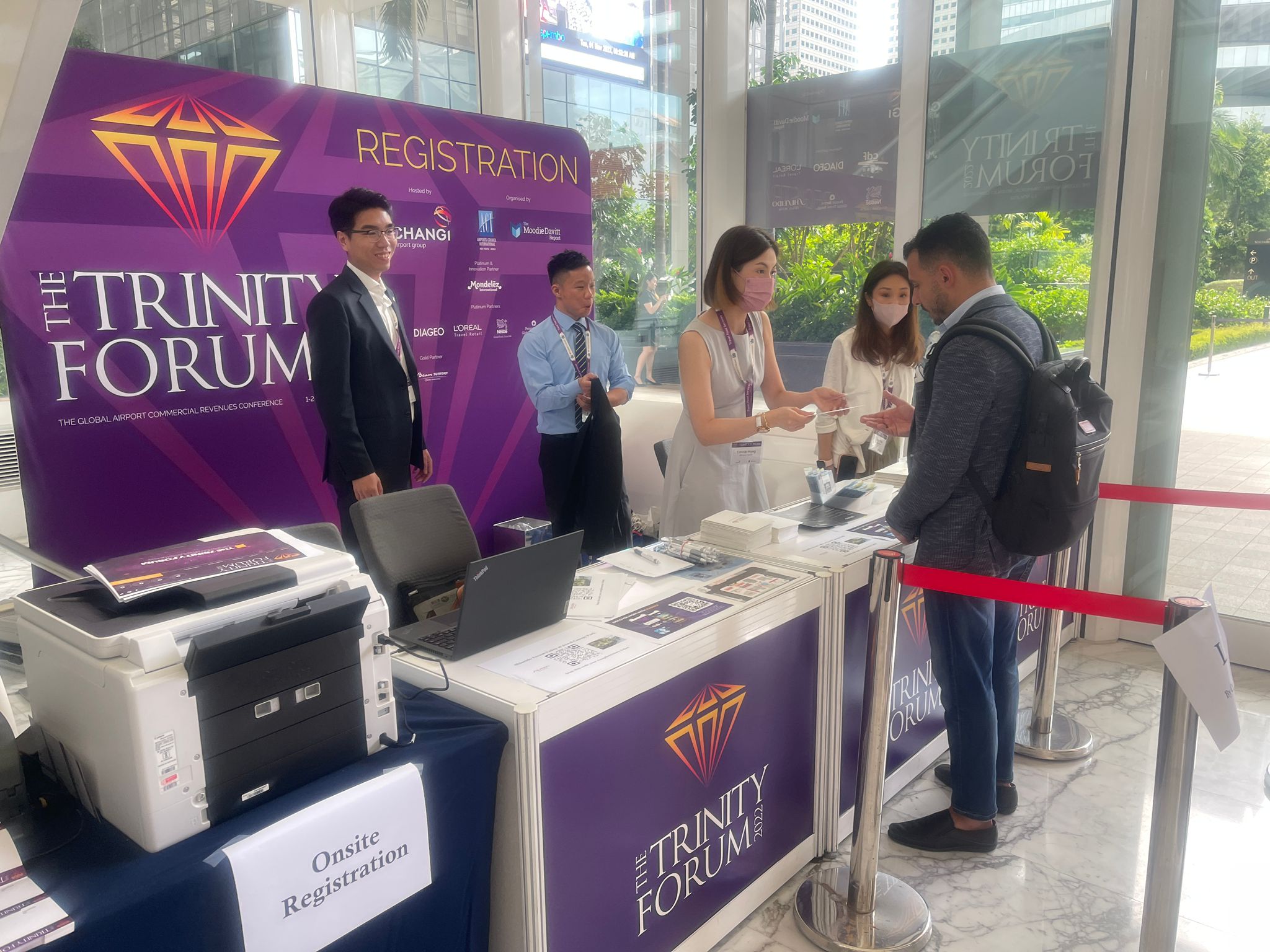
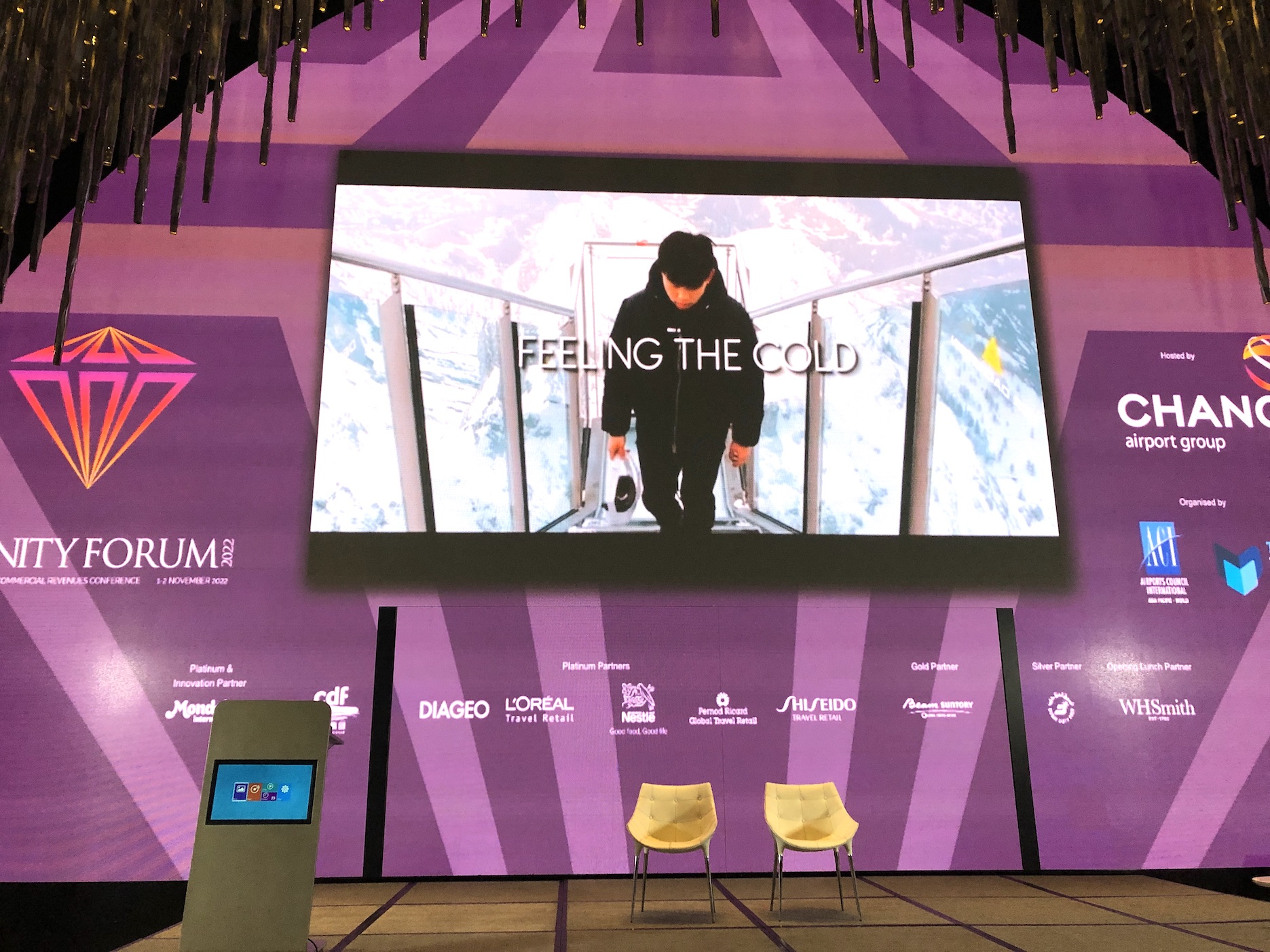
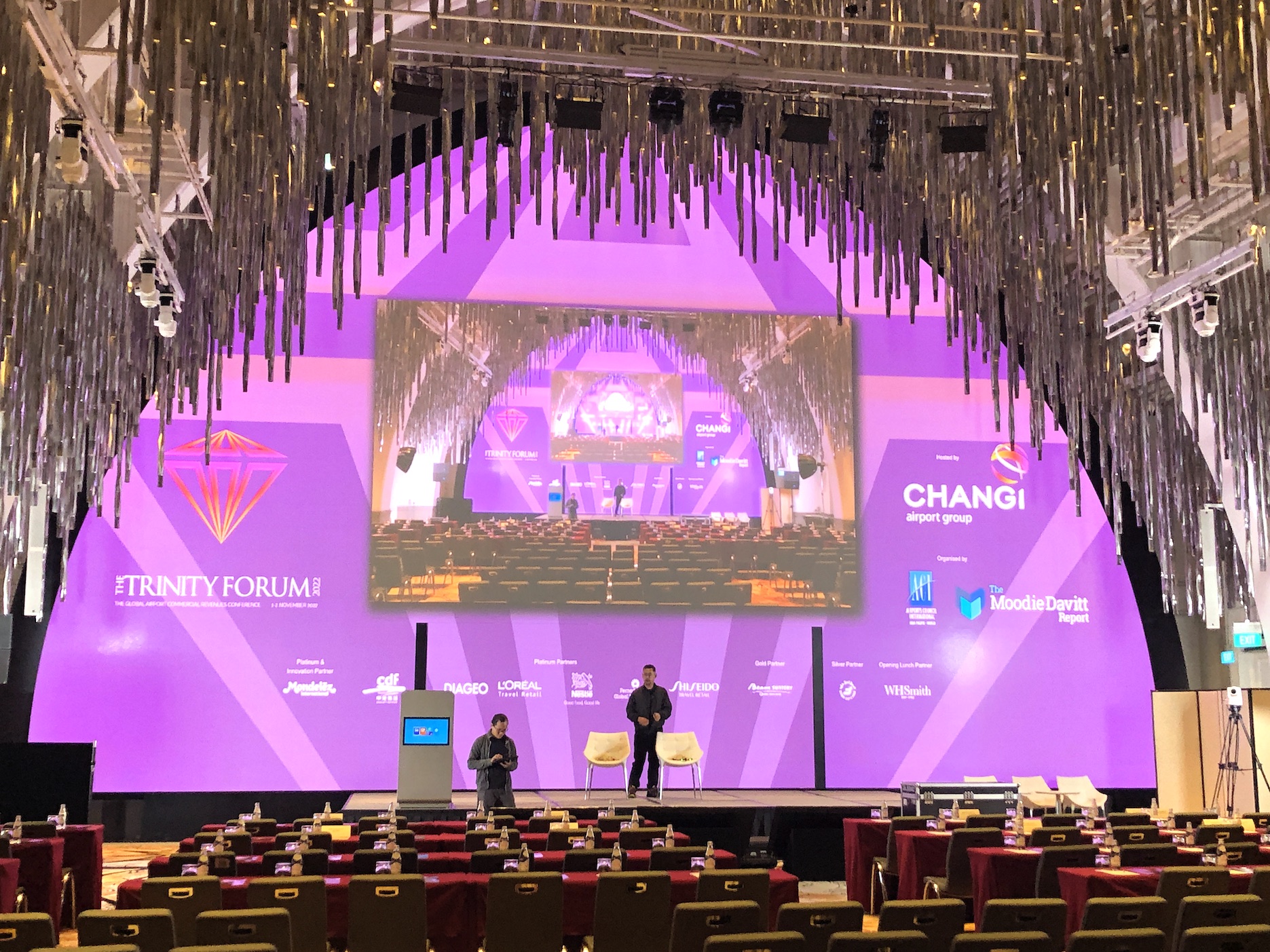
MONDAY 31 OCTOBER






